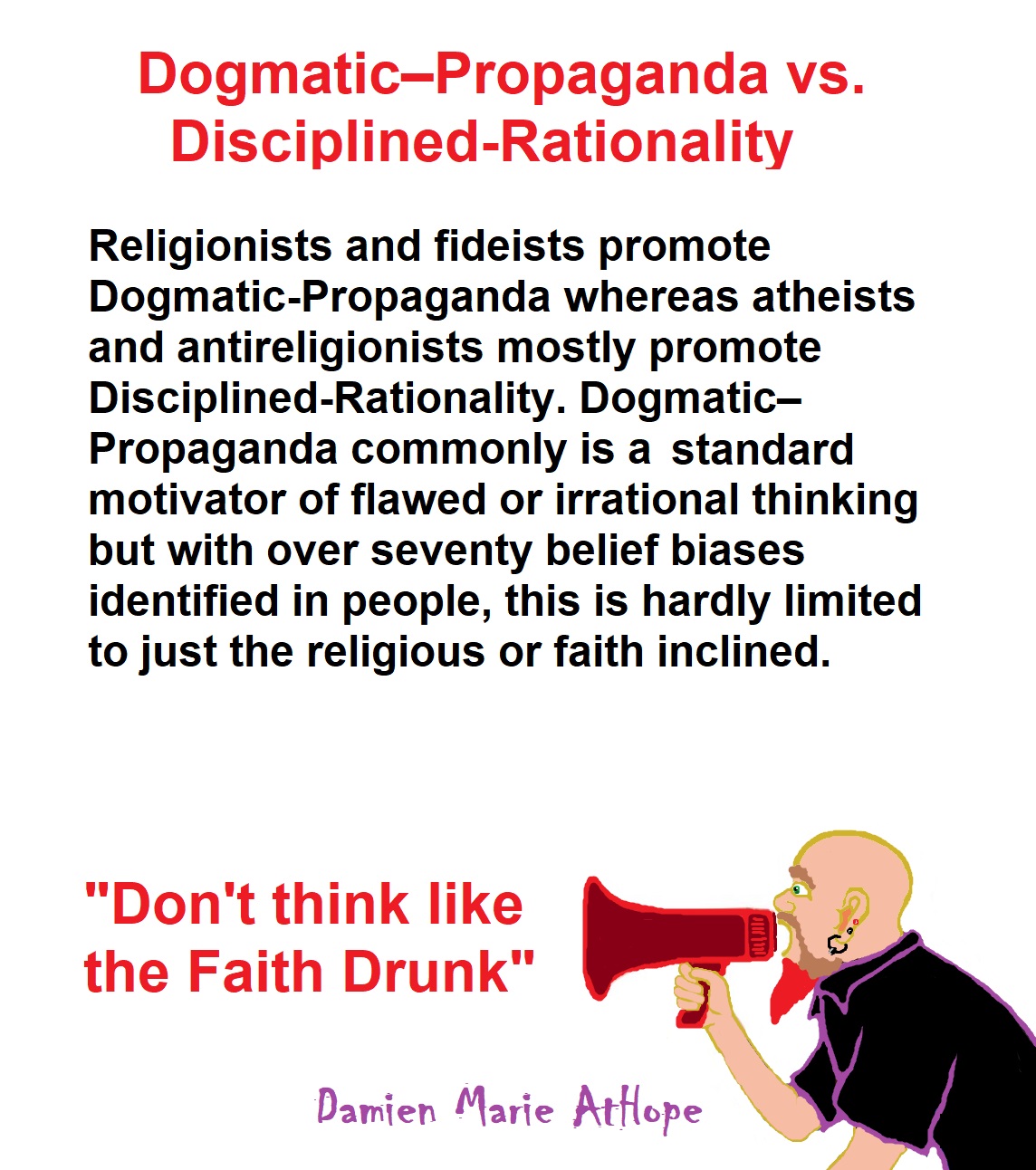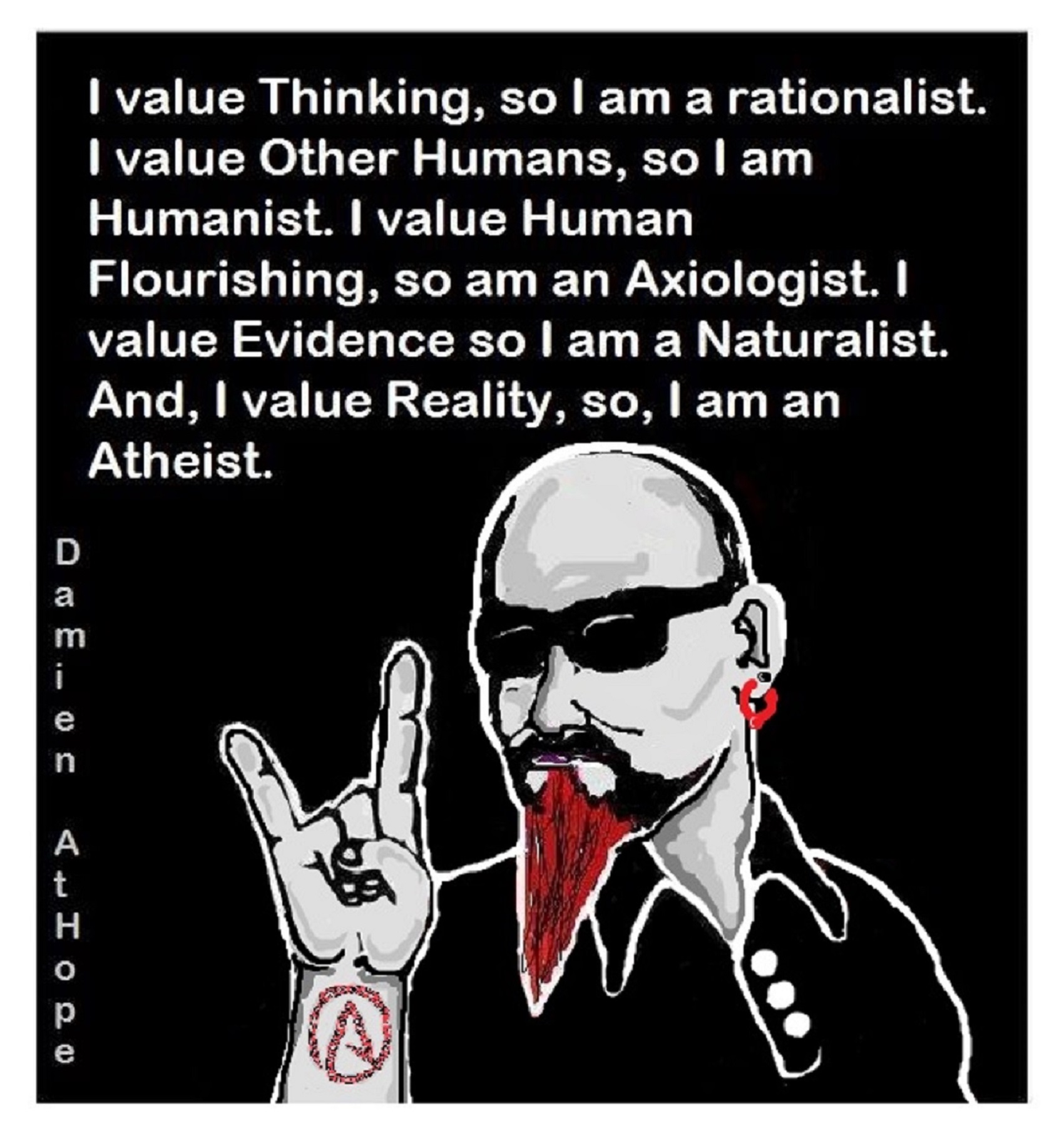
Would we not often do better lighting a candle, than cursing at the darkness?
We need people with the height of bravery, to be openly as kind as others openly hate.
If a god anything was real and good it would not be the harmful world we have. Therefore, no god is good but as gods are often claimed as good so no such gods exist. This is an axiological atheist argument also called the argument from evil.
Explaining Axiological theism, Axiological agnosticism, and Axiological atheism (Video)
I am going to roughly offer the understanding how axiological thinking interacts with differing theological beliefs.
Axiological theism: is the thinking a god(s) or goddess(es) are real as well as valuable and we are enriched (all value, truth, morality are deity involved) because there is such a being(s) and we should worship it and would be worse off if such a being(s) did not exist (life would have no meaning, worth or value and there would be no way to judge morality)
Axiological agnosticism: is the thinking I do not know if a such being as god(s) or goddess(es) exist neither can we evaluate the value and we thus lack the basis to value judge what benefits or harm they may encompass and such would probably not worship such a being(s) as we do not know if we should or should not. Likewise, we cannot form an opinion as to if we are better or worse if such a being(s) existed.
Axiological atheism: is the thinking that no god(s) or goddess(es) exist and they lack all worth and value to humans even if they existed. Such myth should be rejected in favor of believing in humanity, seeing secularism and humanism as a kind of “higher absolute” such as humanity, formal axiology, or naturalistic or universal ethical principles. My stating a kind of “higher absolute” is not stating a belief n some absolute morality instead it is meaning nothing but naturalistic human-centered morality is used or form of valued good is derived from a rational thinking by humanity (Ie. humanity as the absolute source of ethics and values, and permits individuals to resolve moral problems without resorting to god myths or religious philosophies). Axiological atheism would tend to value Formal Axiology (Scientific Axiology/Scientific Value Theory) takes a realistic, or fact-based, view of the world when assessing or understanding value/good/worth. Formal axiology understands that people have and act upon values. Scientific axiologists will seek to understand what those values are, and to analyze their structure. That empirical orientation is why scientific axiology can serve as the formal side of the yet to be developed value sciences. To illustrate this value realism, suppose a theist states they love god(s). Since the science of value has an empirical orientation, a value scientist would see the theistic belief in god(s) not as some actual existing being, instead, understand it as a conception in the mind of theist, not anything realistic or fact-based. Axiological Atheism is like humanistic anti-theism and anti-religionism with strong secularism. Ref
Moreover, an axiological atheist could be thought of as thinking no gods no masters and thus would never worship a god or any being especially if it was by threat, force or the act of coercing to any extent. An axiological atheist may even question if any being is worthy of the title god or be ignostic that every theological position assumes too much about the concept of god and see this as extending to other theological concepts; including (but not limited to) concepts of faith, spirituality, heaven, hell, afterlife, damnation, salvation, sin and the soul. Thus regarding that as ridiculous and not worthy at all and should be shown Ridicule and Disdain. Therefore as you can guess they would say we are better off that no god(s) or goddess(es) existed and it would be much worse if they did.
axiological attitudes toward God’s existence are axiological theism (thinking God’s existence to be a good thing), axiological atheism (thinking God’s existence to be a bad thing) and axiological agnosticism (indifference toward God’s existence). Issues in the Philosophy of Religion an axiological approach
Axiological Atheism Explained
Axiological/axiology (value theory/value science) atheism?
My quick definition of Axiology?
Axiology is a philosophy (value theory) and a social science (formal axiology) mainly involving the “what, why, and how” of “value” the way epistemology approaches “knowledge” as in what is of value/good/worth/beneficial/ or useful? Why is the thing in question of value/good/worth/beneficial/ or useful? How should the value/good/worth/beneficial/ or useful be interacted with?
Philosophic Axiology (value theory) and Scientific Axiology (formal axiology)
Formal Axiology: Another Victim in Religion’s War on Science
*(axiology as philosophy) value theory/the theory of values, meta-ethics/morality or aesthetics:
“Value theory encompasses a range of approaches to understanding how, why, and to what degree persons value things; whether the object or subject of valuing is a person, idea, object, or anything else. Intuitively, theories of value must be important to ethics. This investigation began in ancient philosophy, where it is called axiology or ethics.” Ref
*(axiology as science) formal axiology/the theory of values, meta-ethics/morality or aesthetics:
“Formal axiology is a branch of axiology in general. Axiology in general or “as such” is value theory in all its ramifications, ranging from meta-theory to ethics, aesthetics, logic, and any other dimension of human interest that involves questions of good and evil, right and wrong, correctness or incorrectness, beauty and ugliness, truth and falsity, and every other conceivable value issue, dimension, or interest. Formal axiology, focuses initially upon the most formal features of human values, then upon applications of these formalities to the concrete details of what we value (values) and how we value (valuations). Robert S. Hartman created a logically abstract (he would say “synthetic”) to features of all human values and valuations; the formal definition of “good” or “value,” which he regarded as the “axiom” of formal axiology — Good is concept (or standard) fulfilment, the three basic kinds of value, intrinsic, extrinsic, and systemic, the hierarchy of value, where the three basic kinds of value are themselves ranked with respect to their relative worth, an association of the three basic kinds of value with set theory and transfinite mathematics.” Ref
axiology/axiologist: noun, axiological: adjective, axiologically: adverb
Axiological atheism: (Ethical/Value theory Reasoned and Moral Argument driven) Atheism, Anti-theism, Anti-religionism, and Secular Humanism. Roughly understood axiological atheism = Strong Disbelief as well as Strong Secularism and Humanism.
I am an Axiological Atheist, which roughly can be understood as a value theory or value science Atheist. Axiology to Atheism is also meant to denote an atheistic rejection of the existence of gods or supreme beings in favor of a “higher absolute” such as humanity, formal axiology, or naturalistic or universal ethical principles. My stating a kind of “higher absolute” is not stating a belief in some absolute morality, instead it is meaning nothing but naturalistic human centered morality is used or forms of valued good is derived from a rational thinking by humanity (Ie. humanity as the absolute source of ethics and values, and permits individuals to resolve moral problems without resorting to god myths or religious philosophies). Axiological Atheism can be thought to involve ethical/value theory reasoned and moral argument driven atheism, anti-theism, anti-religionism, ignosticism, apatheism, secularism, and humanism. I am anthropocentric as an Axiological Atheist. I see humans value as above all other life’s value. Some say well, we are animals so they disagree with my destination. But how do the facts play out? So you don’t have any difference in value of life? So a bug is the same as a mouse, a mouse is the same as a dolphin, a dolphin is the same as a human, all to you have exactly the same value? You fight to protect the rights of each of them equally? And all killing of any of them is the same crime murder? I know I am an animal but you also know that we do have the term humans which no other animal is classified. And we don’t take other animals to court as only humans and not any other animals are like us. We are also genetically connected to plants and stars and that still doesn’t remove the special class humans removed from all other animals. A society where you can kill a human as easily as a mosquito would simply just not work ethically to me and it should not to any reasonable person either. Anthropocentrism (from Greek ánthrōpos, “human being”; and kéntron, “center”) the belief that considers human beings to be the most significant entity of the world and interprets or regards the world in terms of human values and experiences.
Formal Axiology (Scientific Axiology/Scientific Value Theory) takes a realistic, or fact-based, view of the world when assessing or understanding value/good/worth. Formal axiology understands that people have and act upon values. Scientific axiologists will seek to understand what those values are, and to analyze their structure. That empirical orientation is why scientific axiology can serve as the formal side of the yet to be developed value sciences. To illustrate this value realism, suppose a theist states they love god(s). Since the science of value has an empirical orientation, a value scientist would see the theistic belief in god(s) not as some actual existing being, instead understand it as a conception in the mind of theist not anything realistic or fact-based. Ref
In my opinion, when it comes to the god concept, an axiological atheist would start with ignosticism which is rejecting the concept of gods because the god concept and the term god has no meaning nor anything in reality to attach its meaning to. Thus, god is not any different than any other made up three word such as fod, which has no meaning as a real thing. If an axiological atheist were asked how important it is to disprove a god or even care about the god question, they would simply not care since the question is meaningless such as looking for an invisible pink unicorn or the jolly green giant. Thus, an axiological atheist could be seen as using apatheism, unless they are under serious challenge or feeling a need to challenge theists or religion believers. An axiological atheist would thus not believe in a god in anyway and likely, this would be called strong atheism. An axiological atheist is more than simply an atheist since axiological atheism sees the god concept as fake or not real and harmful to a free humanity. Thus, an axiological atheist takes an active opposition to theism and their fake gods and even if some god(s) are found to somehow be real then an axiological atheist would start hating that real god and until then, they will hate all manmade god concepts.
Furthermore, an axiological atheist would most likely hate religions for some of the same reasons it opposes god(s) and thus, will be an anti-religionist who sees that religions on the whole to be harmful to humanity. However, an axiological atheist is not against people whether they believe in god concept or religion, they center their hate on harmful ideas such as gods or religions. This hate towards harmful ideas is motivated from a deep ethical care for humanity and thus involves humanism. So, axiological atheism is a humanistic philosophical and ethical stance which emphasizes individually and collectively, the value and agency of human beings and prefers critical thinking and evidence (rationalism, empiricism) over any kind of established doctrines (holy books) or faith (fideism). Moreover, even with axiological atheism’s extremely strong opposition to gods and religion, it does value every persons self-right to define beliefs for themselves and thus, supports secularism (freedom for religion and freedom from religion), protects the religious and nonreligious as well as antireligious from governmental interference and protect the government from the religious, nonreligious as well as antireligious. That being said axiological atheism would like beliefs in gods or religions to be demoted to where they are seen as little more than fantasy or myths but are somewhat harmful and certainly not safe for children.
Axiological atheism: (is thinking that a god’s existence to be a bad thing)
Axiological atheism is the thinking that no god(s) or goddess(es) exist and they lack all worth and value to humans even if they existed. Such myth should be rejected in favor of believing in humanity, seeing secularism and humanism as a kind of “higher absolute” or form of valued good. (Ie. humanity as the absolute source of ethics and values, and permits individuals to resolve moral problems without resorting to god myths or religious philosophies).
An axiological atheist could be thought of as thinking no gods no masters and thus would never worship a god or any being especially if it was by threat, force or the act of coercing to any extent. An axiological atheist may even question if any being is worthy of the title god or be ignostic that every theological position assumes too much about the concept of god and see this as extending to other theological concepts; including (but not limited to) concepts of faith, spirituality, heaven, hell, afterlife, damnation, salvation, sin and the soul.
Thus regarding that as ridiculous and not worthy at all and should be shown Ridicule and Disdain. Therefore as you can guess they would say we are better off that no god(s) or goddess(es) existed and it would be much worse if they did.
Axiological Atheist, can be understood as a value theory or value science Atheist.
As such axiological atheism’s ethically reasoning is constructive and pro-humanity. We who believe we are thinking rational, leading to opposition or hate of religion may that be limited to the nonfactual or oppressive ideology and not the people. Beyond just not being something lets be something, rational thinking should challenge myths but also prove our love for humanity and care for all living beings. In most cases, Axiological atheism would assert the traditional concept of “Atheism” answers only a single question: Is there a creator god or not? That is an important question, but if your answer is “no”, it is only a starting point and not a way of life.
You may have reached that viewpoint based on your respect for logic, evidence, science,and personal experience which too are vital values. Yet, after you have reached that initial “no god” answer, all the other important questions in life, all the options for mental and emotional wholeness and social and environmental harmony, ethics and morality, personal fulfillment, social values, philosophy and psychology remain open. That is where “Axiological Atheism” holds a connection to both further challenging the god concept and devaluing religion and adding a value meaning and ethical axiological ideology to guide universally desirable secular ethical way of being or a value driven life lived in this reality.
What is Axiology, Formal Axiology & Axiological Profiling?
Axiology is the name for “value theory.” It is derived from the Greek word “axios” meaning “worth.” Formal axiology is the logic-based science of value anchored in a “hierarchy of meaning” from the most meaningful or richest value to the most destructive or greatest value loss. The logic specifies 18 different levels of richness. Hartman’s “hierarchy of value” is the mathematical measuring standard for human evaluative judgment and decision-making in life and in all social sectors of life in our culture.
When people make value judgments, they use both their mental and emotional capacities to arrive at their decision. Some people have very solid and reliable decision-making abilities – while others routinely make wrong or inaccurate choices. Axiological profiles measure the quality of the respondent’s judgment and decision-making by gauging both their mental clarity and their emotional orientation & conditioning.
Dr. Leon Pomeroy in his book, The New Science of Axiological Psychology (Pomeroy, 2005), has shown that formal axiology is also empirically valid. Thus, in our axiological assessment profiles we have the solid support of both scientific methods: the deductive logic-based axiomatic method and the inductive, empirical method. Dr. Pomeroy spent over 20 years collecting statistical data for his book cross-nationally, from numerous and diverse eastern and western countries and cultures, and proving that cultures all over the world make value judgments in the same way.
Neuro‐Axiology: merges Neuroscience understanding how the brain works with Axiology’s formal science that makes possible the objective measurement of value how humans make value judgments. (You will ALWAYS choose what you think adds the MOST value to your life.) Accepting the standard of neuroscientific model of consciousness means that everything we think, feel, remember, and do is a function of the brain. This includes the emotion of empathy. We are not empathic because it makes sense to be empathic – meaning that most humans don’t simply reason their way to empathy. Nor do we simply learn empathy (although brain development is an interactive process with the environment, so we can’t rule out environmental influences). For the most part, we have empathy because our brains are wired with empathy as a specific function.
Like every function of the body you can think of, if it is not essential for survival then some subset of the human population likely has a disorder or even absence of this function. We recognize the biological limits of empathy or absence of empathy as the disorder, psychopathy. It is estimated that about 1% of the general population are psychopaths, while about 20-30% of the US prison population. Dr. Robert S. Hartman discovered that people hold back a 40% latent reserve of cooperation and productivity until they have been valued as human beings.
Axiology is the science of how humans value and make value judgments as well as how they relate to ethics (not moral values often religious or culture relative).
The basics of Axiology are in its 3 Classes of Value and 6 “Advisors”. The following are the Classes of Value:
1. Systemic: plans, rules, best practices, procedures; ideas or expectations
2. Extrinsic: practical or situational; measurable, tracked; tasks (tangible)
3. Intrinsic: personal or transcendent; infinitely valuable; irreplaceable; human beings (intangibles)
The following are the 6 Advisors which consist of 2 views of one inward and one outward and one must remember people are neither their thoughts nor their advisors.
1. World View: Empathy-Intuition “people”, Practical Judgment “tasks, & Systems Thinking “plans & ideas”
2. Self View: Self-Esteem “who you are”, Role Awareness “what you do,” & Self Direction “where you go”.
The word “Axiological” (to the term “Axiological atheism” is meant to denote an atheistic “Value” rejection of the existence of gods or supreme beings and in favor of a “higher absolute” such as humanity or universal ethical principles. The perception of moral obligation removed from ethical sensitivity to universal justice [is] thus unintelligible as “higher absolute”. As a form of atheism, Axiological favors humanity as the absolute source of holistic ethics and care values which permits individuals to resolve moral problems without resorting to a god’s moral obligation which is anti-humanity and not needing to connect to equal justice. Axiological Atheism can be seen as ethically reasoned antitheism and antireligionism where it is all about axiology values that underlie the universal truths. A few examples of universal truths such as there is no such thing as just rape, no honorable thoughtful unwanted torture, and no just humanistic caring abuse of the innocent. You can offer excuses but the true values violations hold true. Axiologists are broadly concerned with all forms of value including aesthetic values, ethical values, and epistemic values. In a narrow sense, axiologists are concerned with what is intrinsically valuable or worthwhile—what is desirable for its own sake. All axiological issues are necessarily connected to ontological and epistemological assumptions.
Axiology in Axiological Atheism can be seen as applying science of morality, referring to its ethically naturalistic views basing morality on rational and empirical consideration of the natural world. The idea of a science of morality has been explored by writers like Joseph Daleiden in The Science of Morality: The Individual, Community, and Future Generations or more recently by neuroscientist Sam Harris in the 2010 book The Moral Landscape. Harris’ science of morality suggests that scientists using empirical knowledge, especially neuropsychology and metaphysical naturalism, in combination with axiomatic values as “first principles”, would be able to outline a universal basis for morality. Harris and Daleiden chiefly argue that society should consider normative ethics to be a domain of science whose purpose amounts to the pursuit of flourishing (well-being). “Science” should not be so narrowly defined as to exclude important roles for any academic disciplines which base their conclusions on the weight of empirical evidence. The term “science of morality” is also sometimes used for the description of moral systems in different cultures or species.
The axiological movement emerges from the phenomenological method. The axiologists sought to characterize the notion of value in general, of which moral value is only one species. They argue against Kant, that goodness does not exclusively derive from the will, but exists in objective hierarchies. They emphasize the extent to which it is through emotions and feelings that human beings discern values. The notion of right action is understood derivatively in terms of the values which emotions reveal. Evolutionary psychology seems to offer an account of the evolution of our “moral sense” (conscience) that dispenses with any reference to objective values. Its apparent elimination of objective values on the grounds of their being unneeded in explanation has led the skeptical writings of J.L. Mackie and Michael Ruse. By contrast, Robert Nozick has resisted this interpretation of evolution (1981) arguing that an evolutionary account of the moral sense can no more dispense with values than an evolutionary account of perception can dispense with perceptual objects objectively present in the world. Axiologists in contemporary ethics are Platonists such as Iris Murdoch and Neo-Kantian theorists such as John Rawls and Robert Nozick.
Tenets of Secular Ethics
Despite the width and diversity of their philosophical views, secular ethicists generally share one or more principles:
• Human beings, through their ability to empathize, are capable of determining ethical grounds.
• Human beings, through logic and reason, are capable of deriving normative principles of behavior.
• Human beings have the moral responsibility to ensure that societies and individuals act based on these ethical principles.
• Societies should, if at all possible, advance from a less ethical, less empathy, and unjust form to a more ethical, more empathy and just form.
I Am An Axiological Atheist?
Explaining Axiological theism, Axiological agnosticism, and Axiological atheism
My Facebook Page: Axiological Atheist
– Humanist Manifesto III, 2003
Knowledge of the world is derived by observation, experimentation, and rational analysis. Humanists find that science is the best method for determining this knowledge as well as for solving problems and developing beneficial technologies. We also recognize the value of new departures in thought, the arts, and inner experience—each subject to analysis by critical intelligence.
Humans are an integral part of nature, the result of unguided evolutionary change. Humanists recognize nature as self-existing. We accept our life as all and enough, distinguishing things as they are from things as we might wish or imagine them to be. We welcome the challenges of the future, and are drawn to and undaunted by the yet to be known.
Ethical values are derived from human need and interest as tested by experience. Humanists ground values in human welfare shaped by human circumstances, interests, and concerns and extended to the global ecosystem and beyond. We are committed to treating each person as having inherent worth and dignity, and to making informed choices in a context of freedom consonant with responsibility.
Life’s fulfillment emerges from individual participation in the service of humane ideals. We aim for our fullest possible development and animate our lives with a deep sense of purpose, finding wonder and awe in the joys and beauties of human existence, its challenges and tragedies, and even in the inevitability and finality of death. Humanists rely on the rich heritage of human culture and the lifestance of Humanism to provide comfort in times of want and encouragement in times of plenty.
Humans are social by nature and find meaning in relationships. Humanists long for and strive toward a world of mutual care and concern, free of cruelty and its consequences, where differences are resolved cooperatively without resorting to violence. The joining of individuality with interdependence enriches our lives, encourages us to enrich the lives of others, and inspires hope of attaining peace, justice, and opportunity for all.
Working to benefit society maximizes individual happiness. Progressive cultures have worked to free humanity from the brutalities of mere survival and to reduce suffering, improve society, and develop global community. We seek to minimize the inequities of circumstance and ability, and we support a just distribution of nature’s resources and the fruits of human effort so that as many as possible can enjoy a good life.
Humanists are concerned for the well being of all, are committed to diversity, and respect those of differing yet humane views. We work to uphold the equal enjoyment of human rights and civil liberties in an open, secular society and maintain it is a civic duty to participate in the democratic process and a planetary duty to protect nature’s integrity, diversity, and beauty in a secure, sustainable manner.
Thus engaged in the flow of life, we aspire to this vision with the informed conviction that humanity has the ability to progress toward its highest ideals. The responsibility for our lives and the kind of world in which we live is ours and ours alone.
Humanist Manifesto is a trademark of the American Humanist Association
© 2003 American Humanist Association
Axiological atheism: (Ethical/Value theory Reasoned and Moral Argument driven) Atheism, Anti-theism, Anti-religionism, and Secular Humanism. Roughly then axiological atheism = Strong Disbelief as well as Strong Secularism and Humanism
Here’s What Being Good Without God Actually Means
The Pew Research Center took a look at what people without a religious affiliation think is essential to morality.
In recent years, researchers have begun to study the moral practices of a relatively new and growing group within America’s religious landscape — the “nones.” Nones are people who, when asked to describe their religious affiliation, respond that they are atheist, agnostic, or “nothing in particular.” As of 2014, the nones, also known as the “unaffiliated,” are the second largest religious grouping in America, coming in just under evangelical Christians. As a whole, the unaffiliated tend to be less religious by the standards that surveyors have traditionally used to measure religiosity — attendance at worship services, for example, or daily prayer. But if they’re not religious by these standards, how exactly are the nones approaching the question of what it means to be a moral person? Thanks to the Pew Research Center, we now have some data on this. In a recent report on religion in everyday life, the organization asked unaffiliated people whether 16 pre-selected beliefs and behaviors were essential, important but not essential, or not important to what they think it means to be a “moral person.” For the unaffiliated, honesty tops the list, with about 58 percent of the nones saying that “being honest at all times” was essential to being a moral person. When Harvard chaplain Greg Epstein heard that honesty came out on top, it made a lot of sense to him. As author of “Good Without God: What a Billion Nonreligious People Do Believe,” Epstein has spent a considerable amount of time thinking about what nonbelievers actually hold to be true about tolerance, community, and morality. “Of course these are people who are interested in honesty and integrity,” Epstein told The Huffington Post. “[Because if you’re coming out as non-religious], then you probably feel a very strong pull to tell the truth and to be honest with yourself and others about who you are.” Epstein suggested that the act of coming out as a nonbeliever requires a good deal of soul searching and introspection. In a country like America, where the overwhelming majority of people belong to some sort of religion, and where statistics show most of the public has negative feelings towards people who don’t believe in God, Epstein said that there really isn’t any incentive or social pressure to come out as non-religious, or atheist, or agnostic. Some other essentials that the unaffiliated believe make a moral person are being grateful for what you have (53 percent), committing to spend time with family (47 percent), forgiving those who have wronged you (39 percent), and working to protect the environment (35 percent). Beliefs and practices that have been traditionally used to measure religiosity fell near the bottom of the list. About 10 percent of the unaffiliated believe praying regularly is essential to being moral. Two percent believe attending religious services is part of a moral life. In an open-ended question, about a quarter (23 percent) of nones wrote that the “Golden Rule,” a behavior cited by Jesus in the Bible, was essential to morality. For Epstein, the results of the Pew survey are evidence that the religiously unaffiliated community values action over belief in the supernatural. “[Humanist and nonreligious people] respect completely the fact that our religious neighbors also feel the need to pray, but our view is that action is irreplaceable,” Epstein said. “Actions ultimately make the difference between living a good life and not living a good life.”
Axiological Atheism Further Explained
Interview of Formal Axiological Atheist Dr. William Kelleher
Axiological Atheism Morality Critique: of the bible god
Chastised in a Message on My Axiological Atheist Page & My Responses
Using Axiological Awareness to Assist in Argumentation.
Explaining Axiological theism, Axiological agnosticism, and Axiological atheism
Ontology, Epistemology, & Axiology argument/challenge protocol
On the Value of Being a Real Person
Axiology, Naturalism, Realism and Moral Theory Ideas
Philosophical Skepticism, Solipsism and the Denial of Reality or Certainty
Value-blindness Gives Rise to Sociopathic evil.
People Matter People Have Value
Reasons for or Types of Atheism
“In the end all we really have is each other and life is too damn short to not be kind.”
Challenging Agnosticism Assumptions
Theists and Atheists as well as Agnostics?
A Challenge to My Anti-Agnostic Thinking?
Weak Theism and Weak Atheism being called Agnostic?
Addressing “ATHEISM”, reasons for it and its possible types/styles
Explaining Axiological theism, Axiological agnosticism, and Axiological atheism
Agnosticism Beliefs Involve “FOLK LOGIC” Thinking?
Discussions on Agnosticism and Atheism
Agnosticism: Non-Standard Epistemology
Agnosticism No Thanks, I am Ignostic
I am a caring firebrand atheist, wishing to be hard on ideas but kind to people.
My life; the good, the bad, and the ugly on the road to the Mental Freedom of Atheism
I Believe Archaeology, not Myths & Why Not, as the Religious Myths Already Violate Reason!
Archaeological, Scientific, & Philosophic evidence shows the god myth is man-made nonsense.
I am not the thing abuse made, I am a shooting star blazing bright, shining far pass my past.
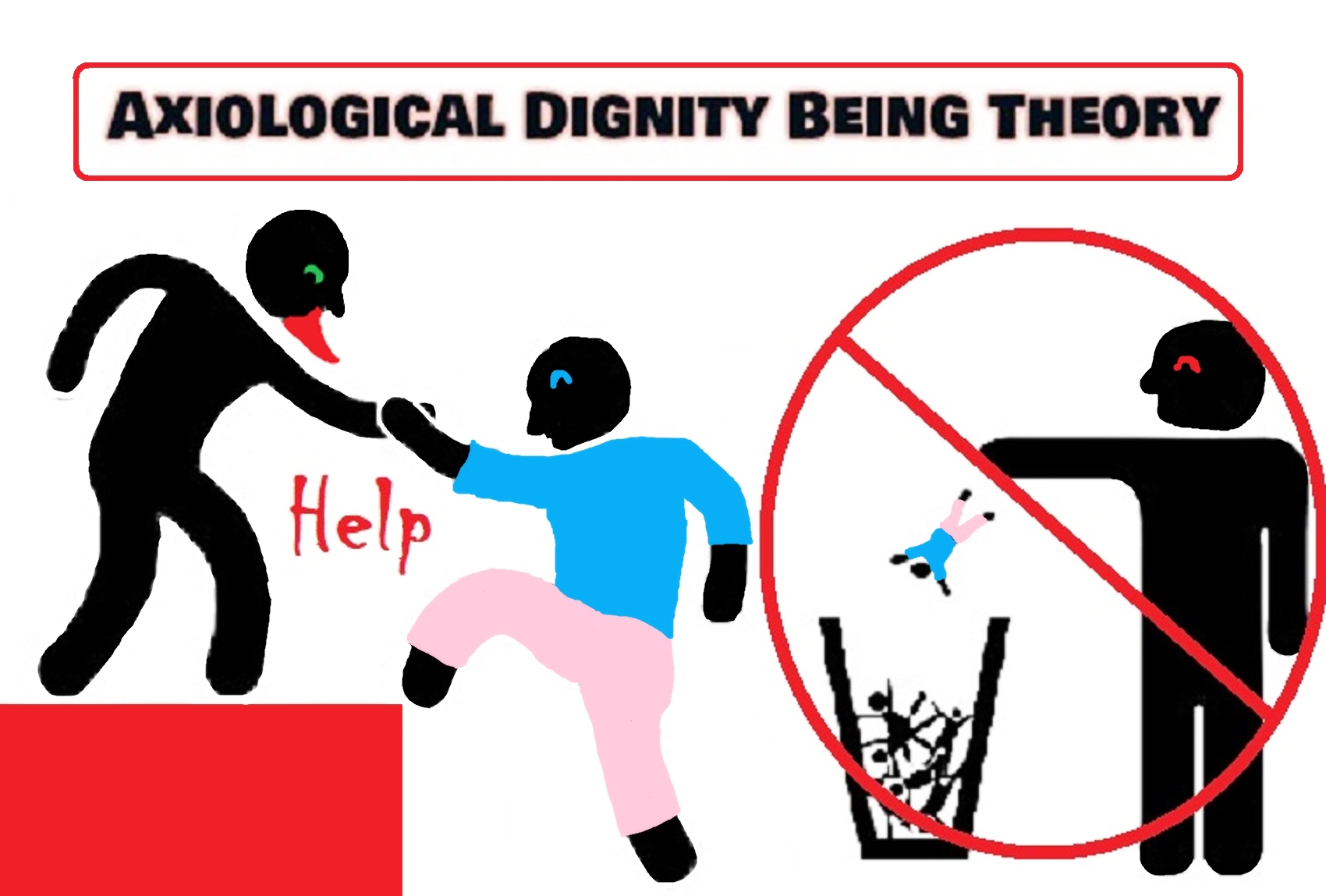
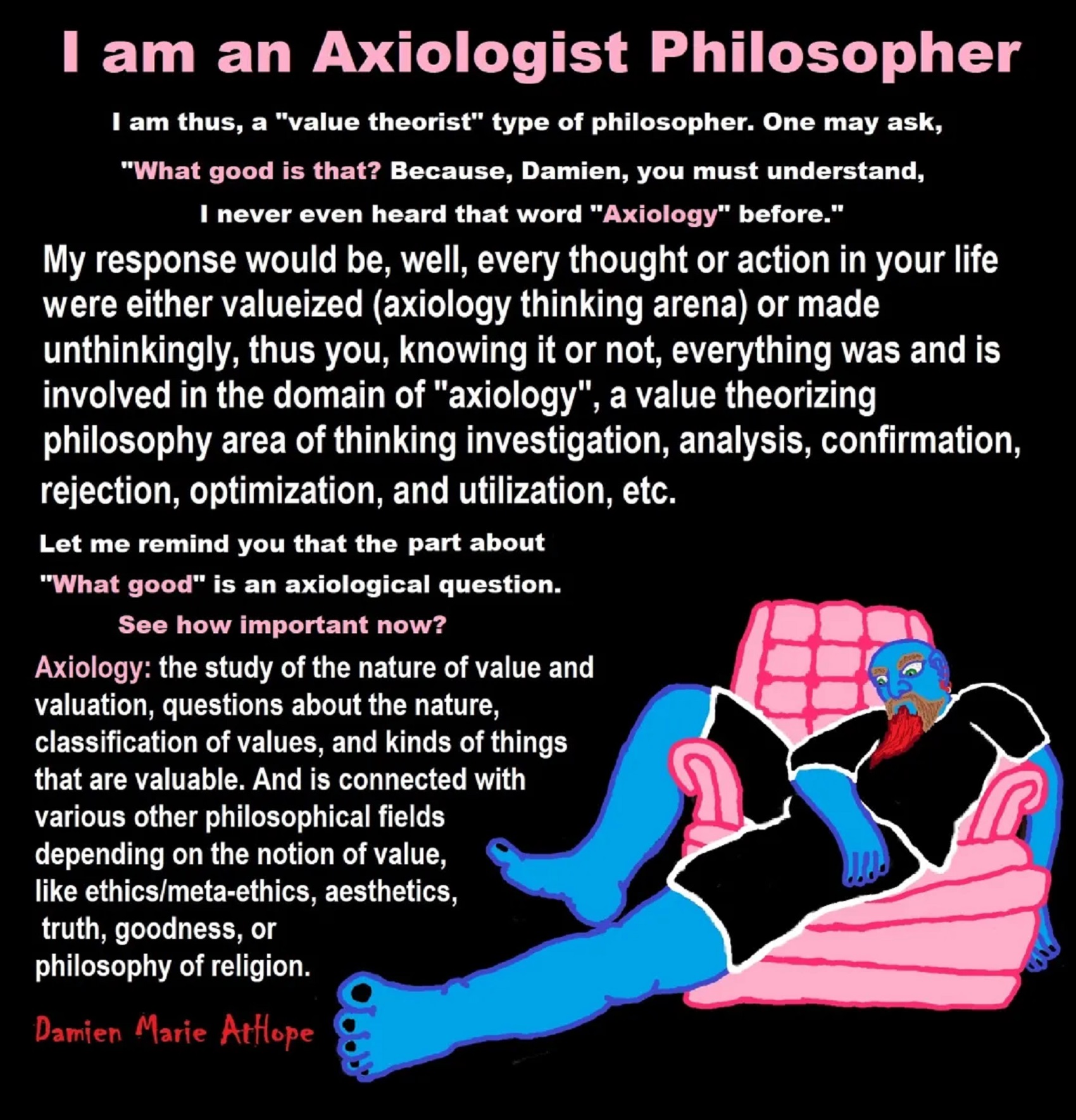
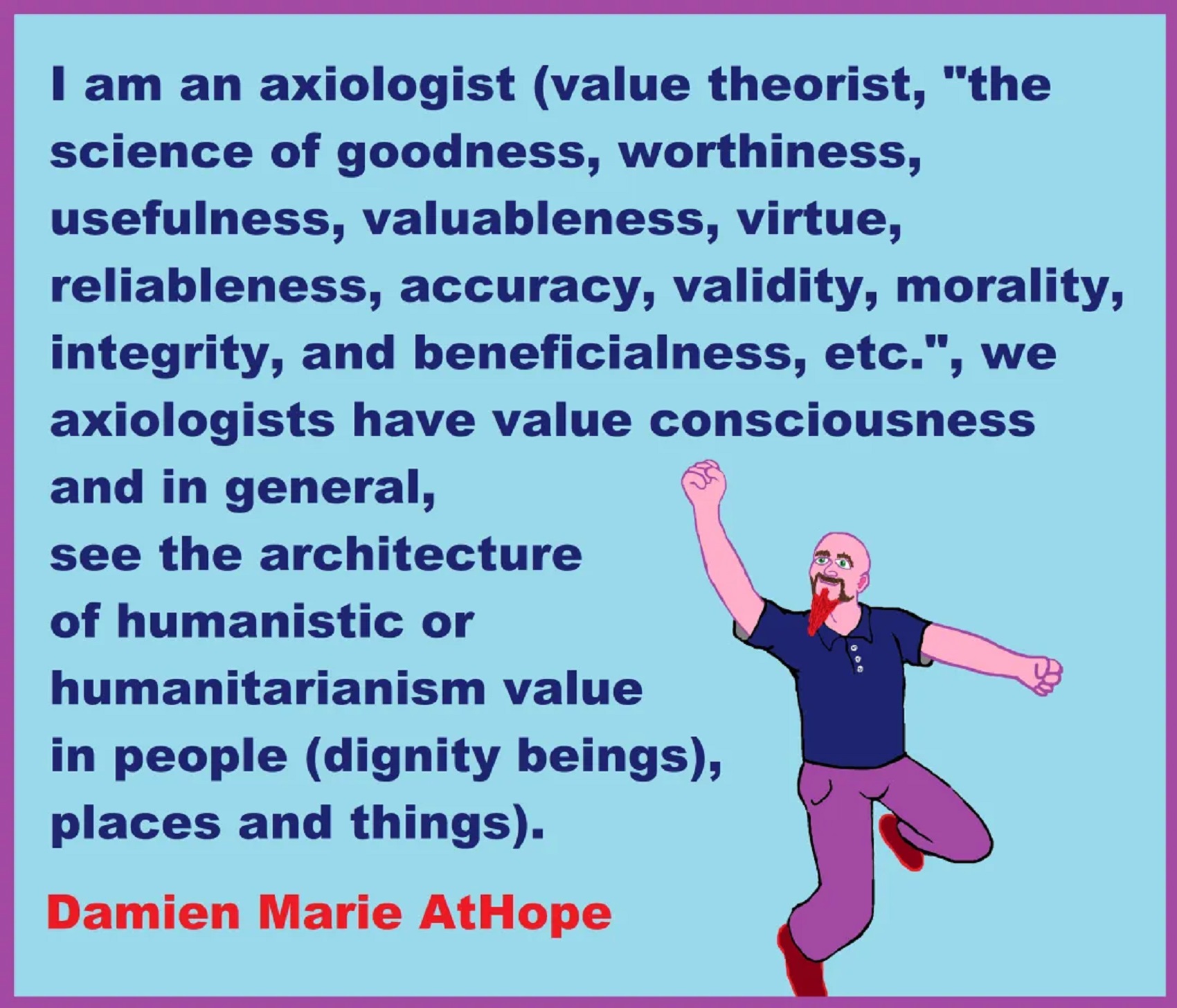
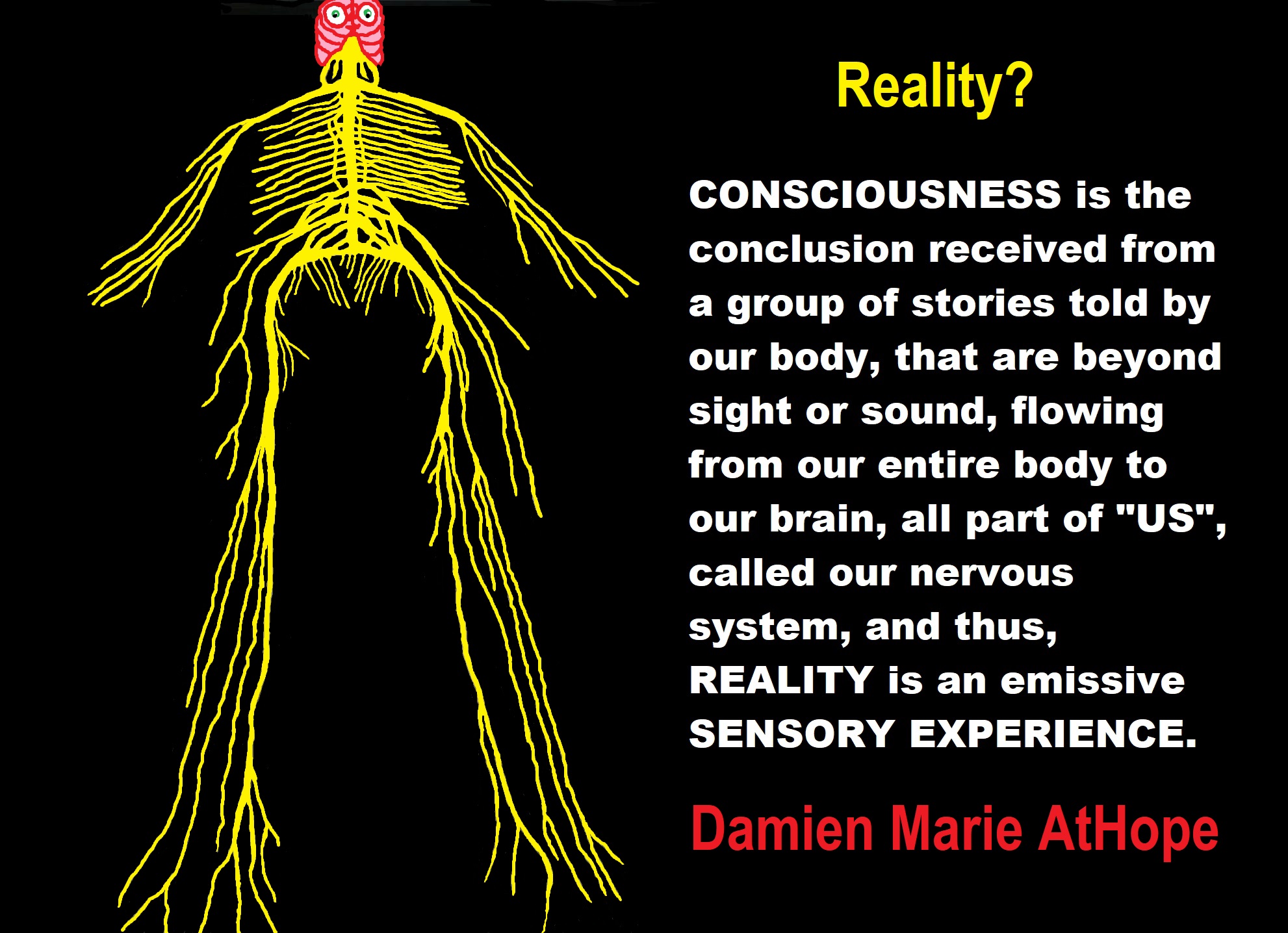
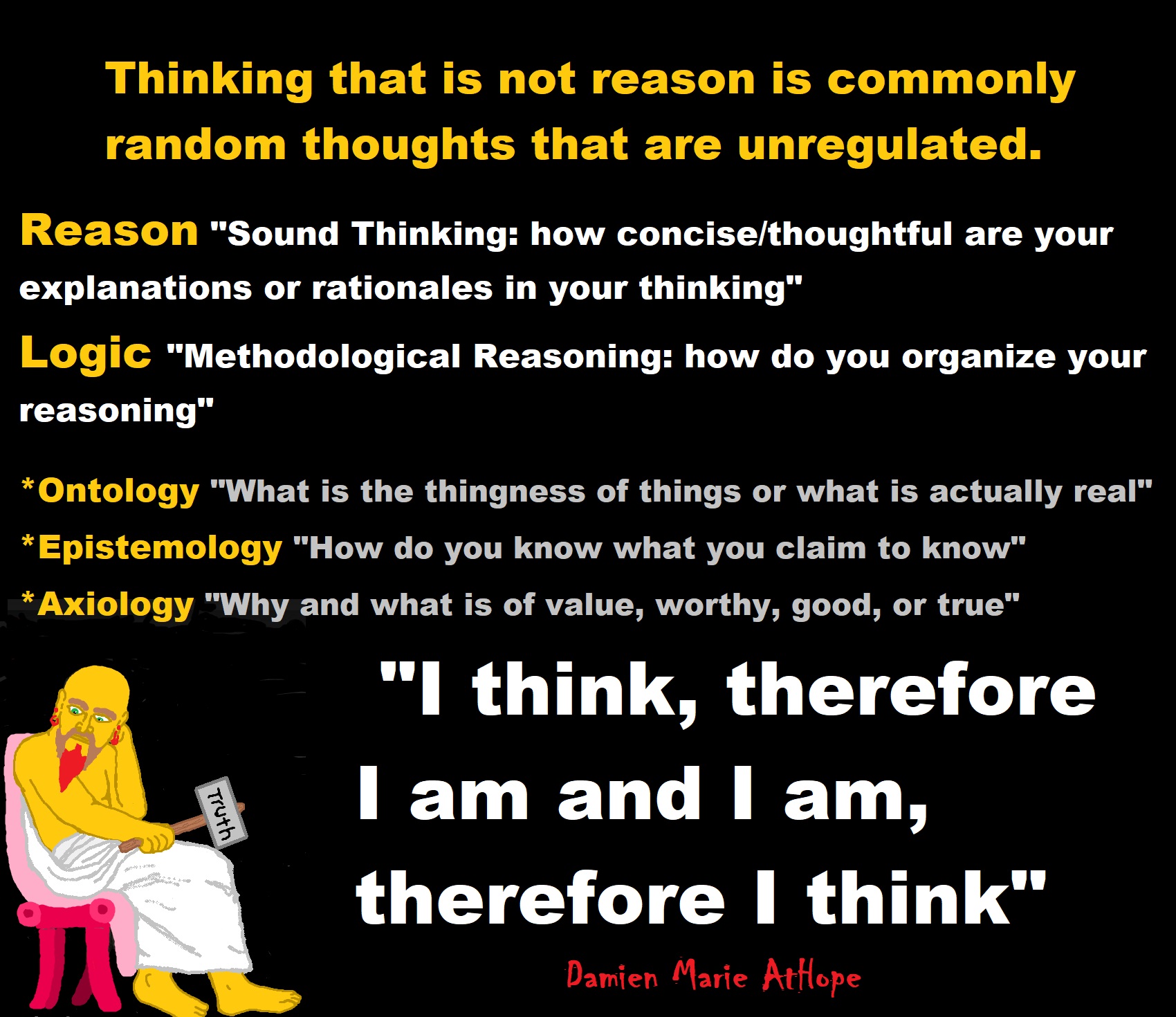
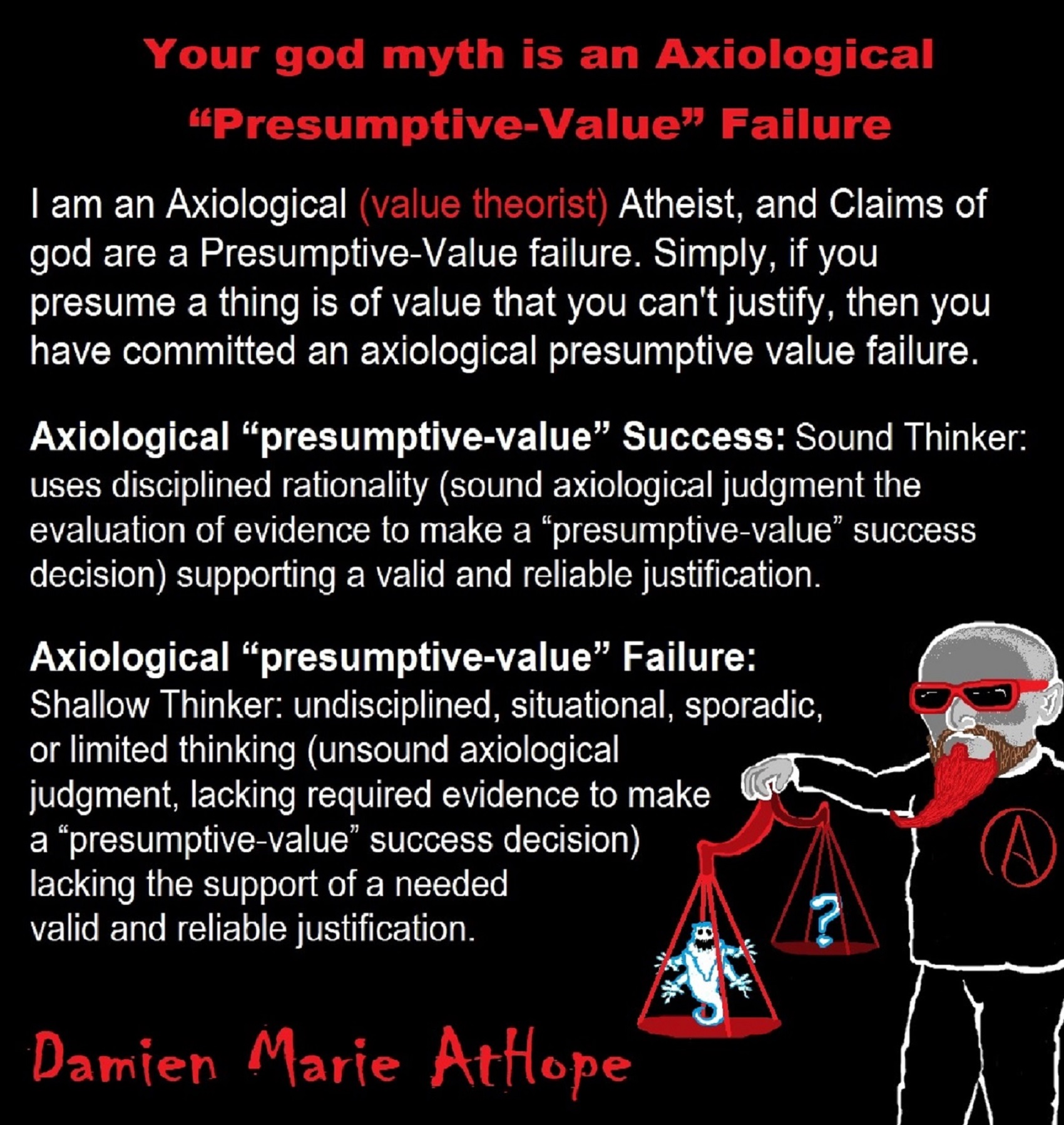
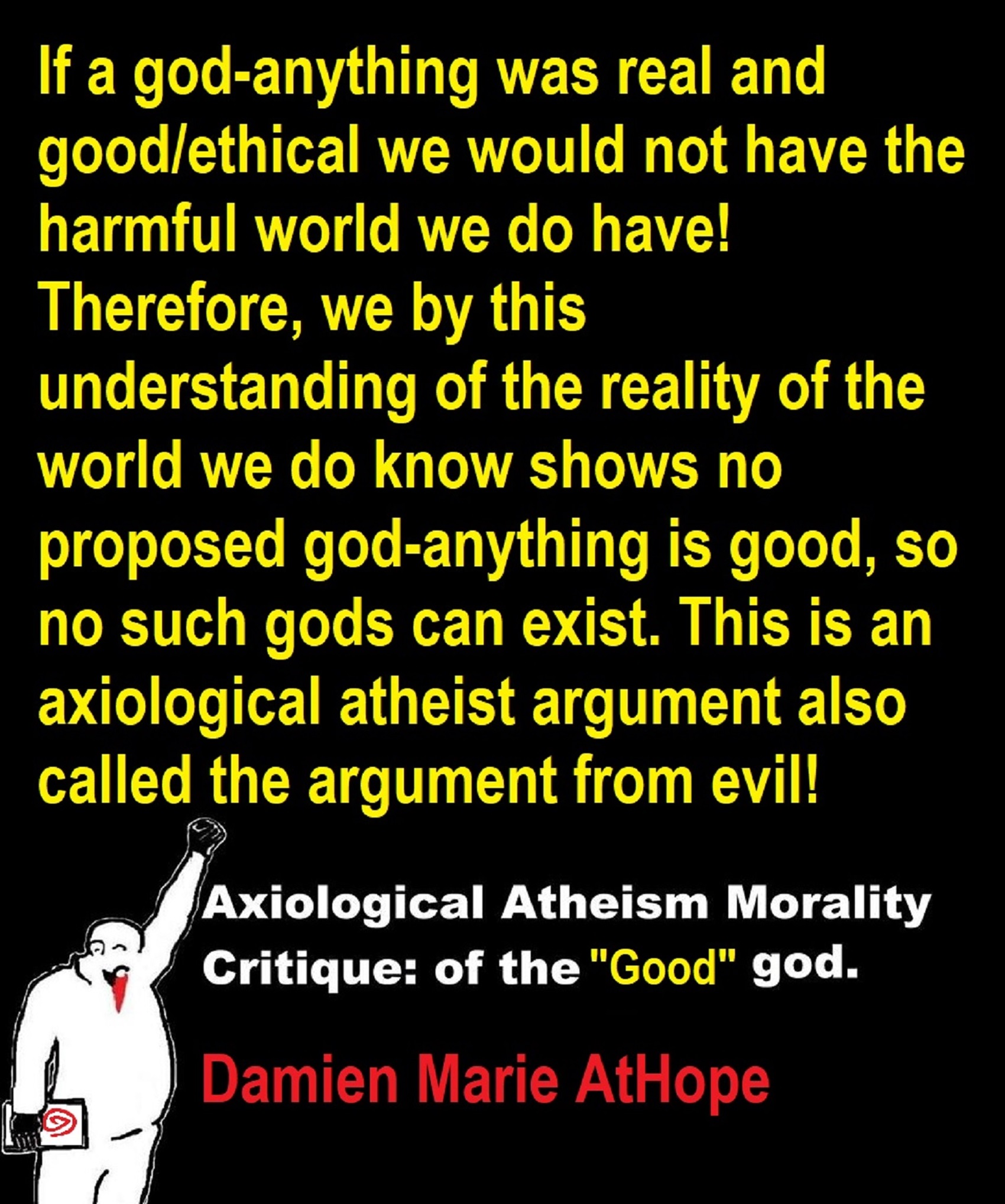
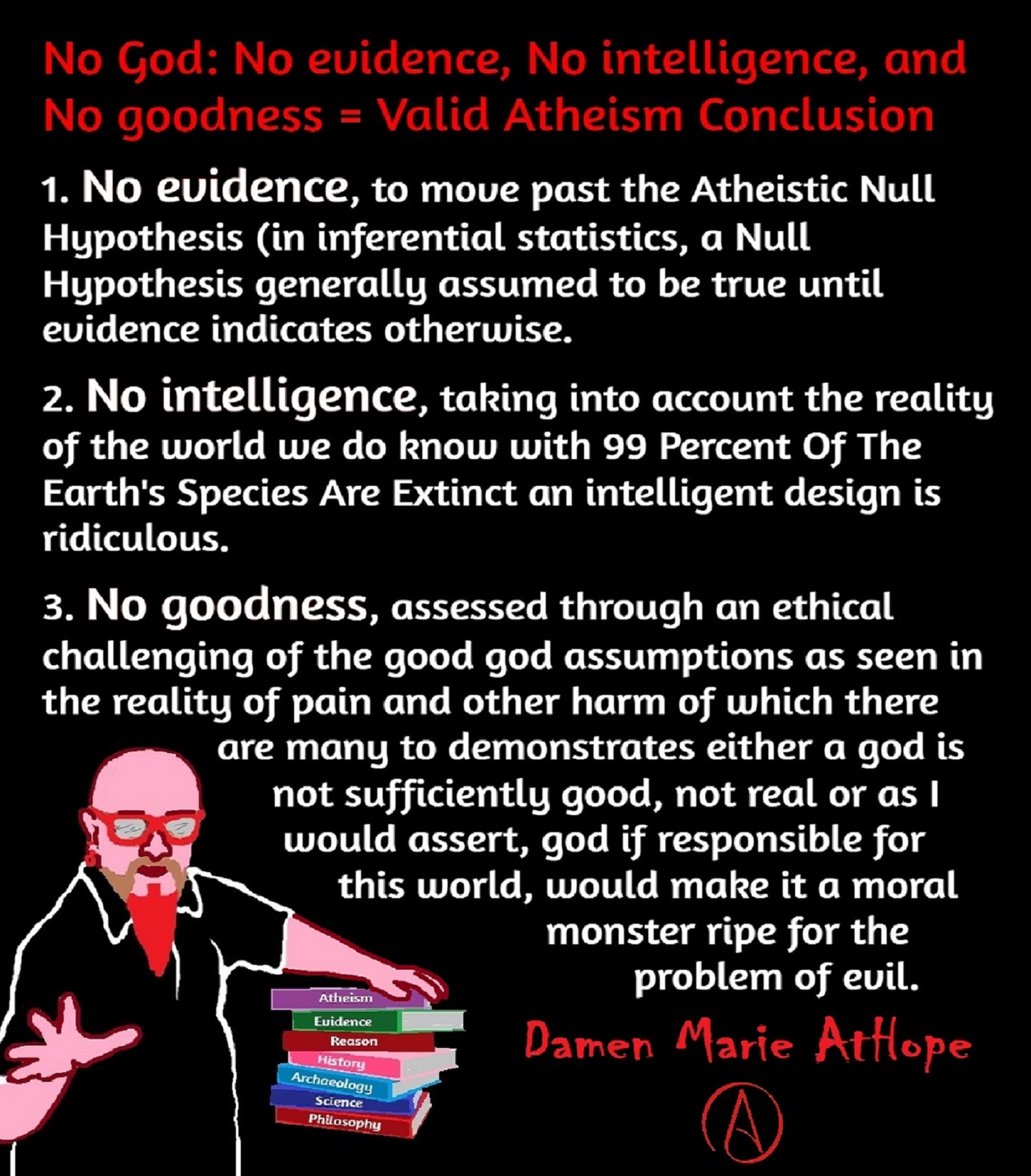
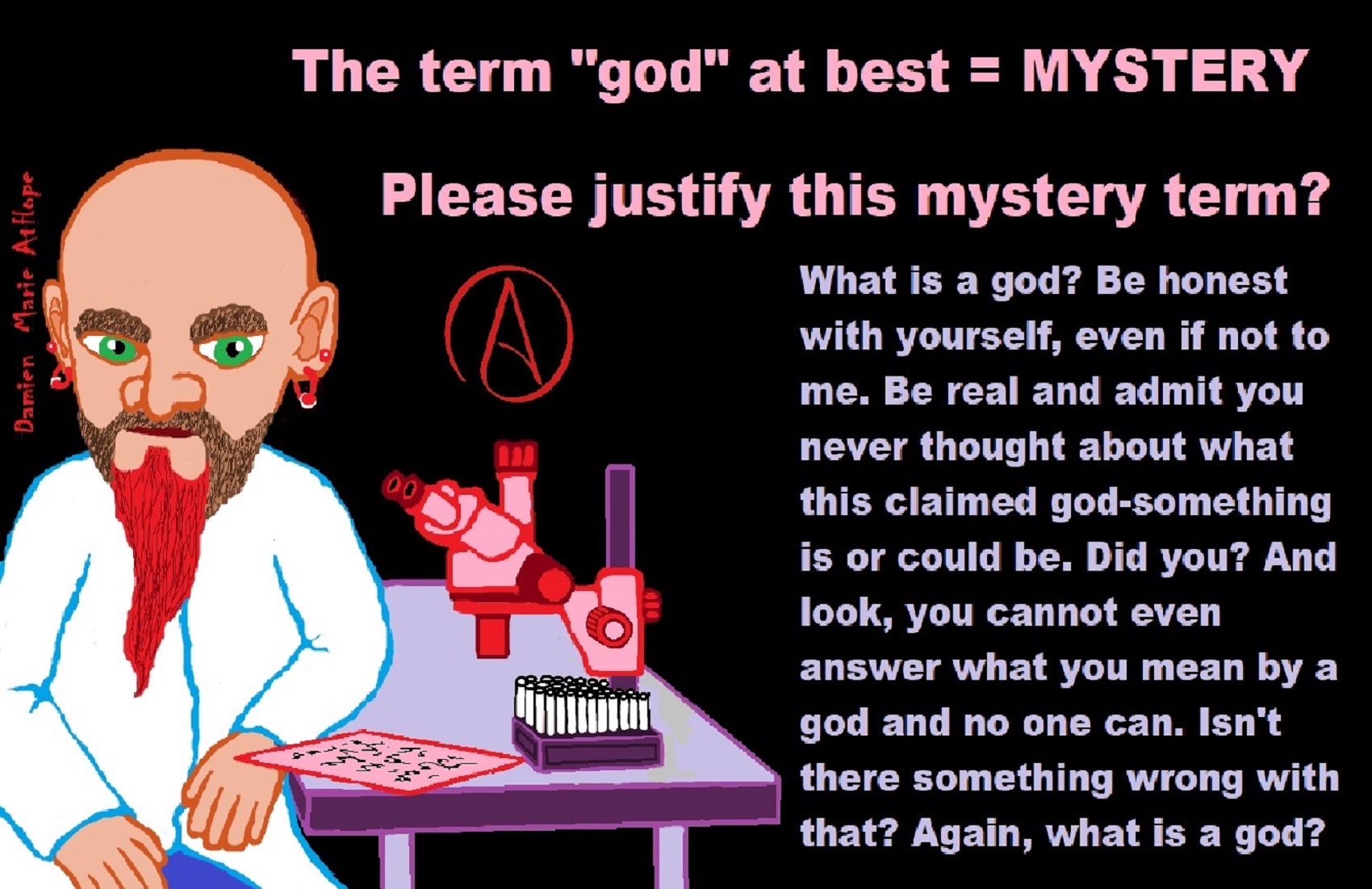
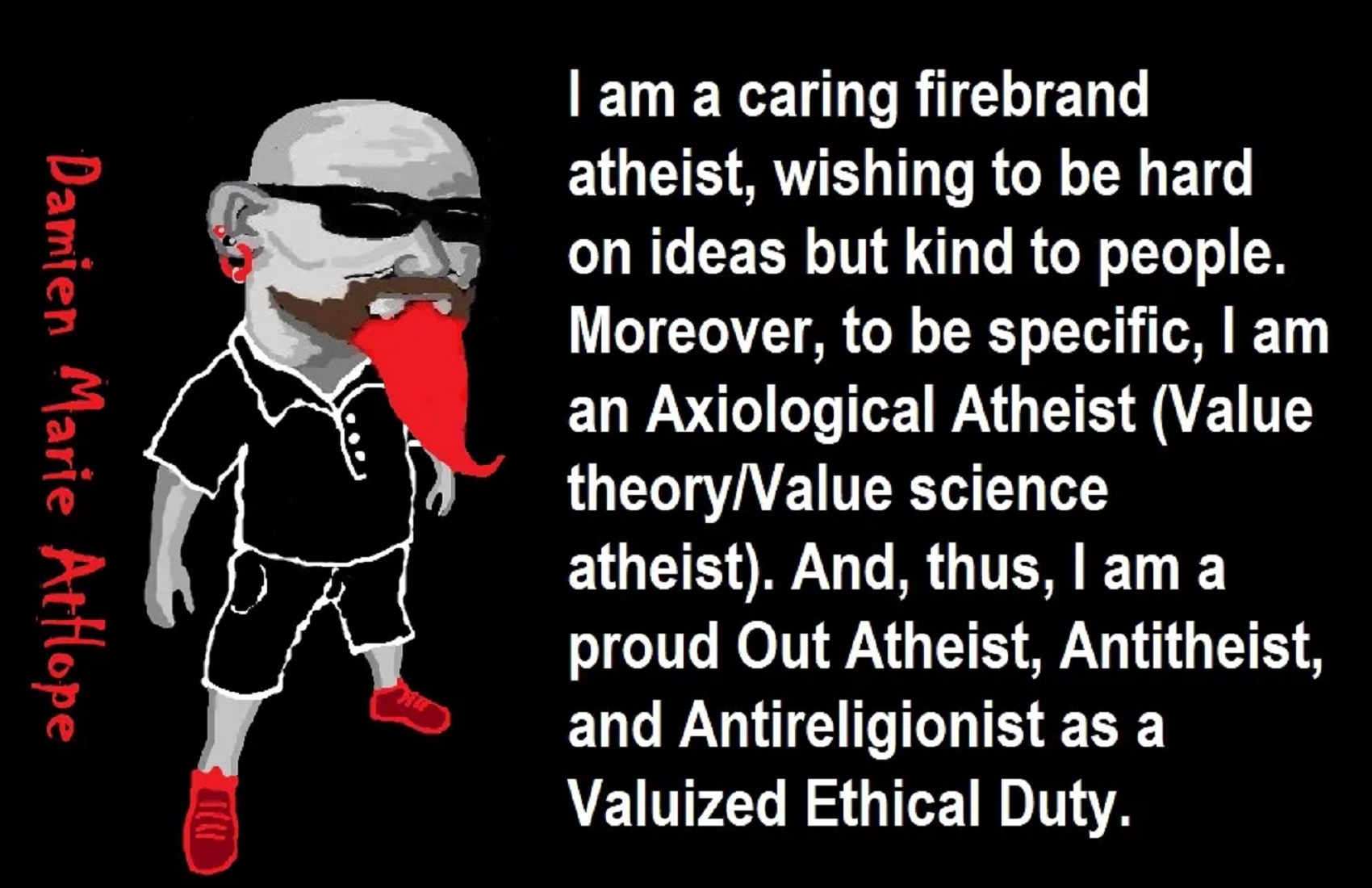
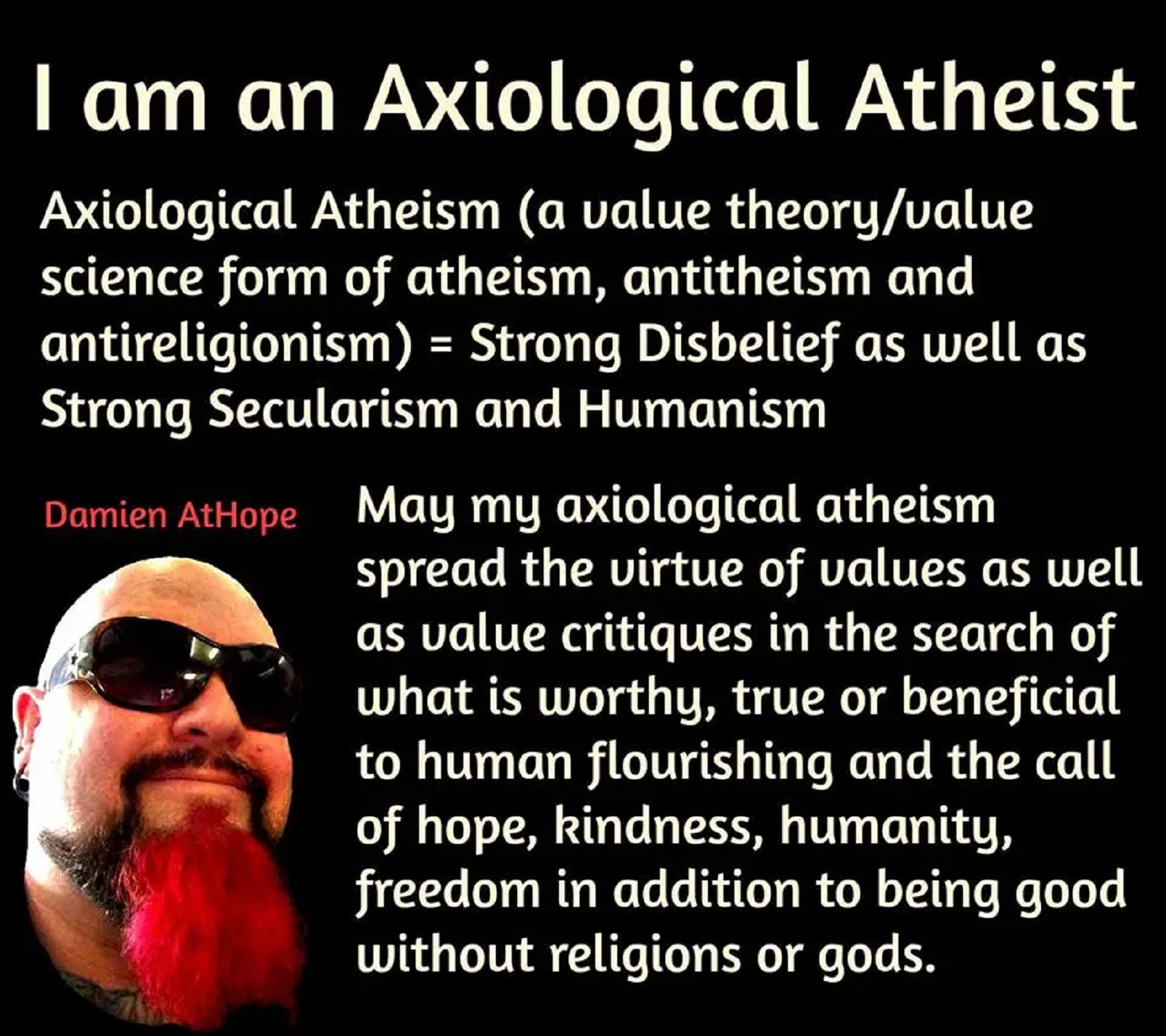
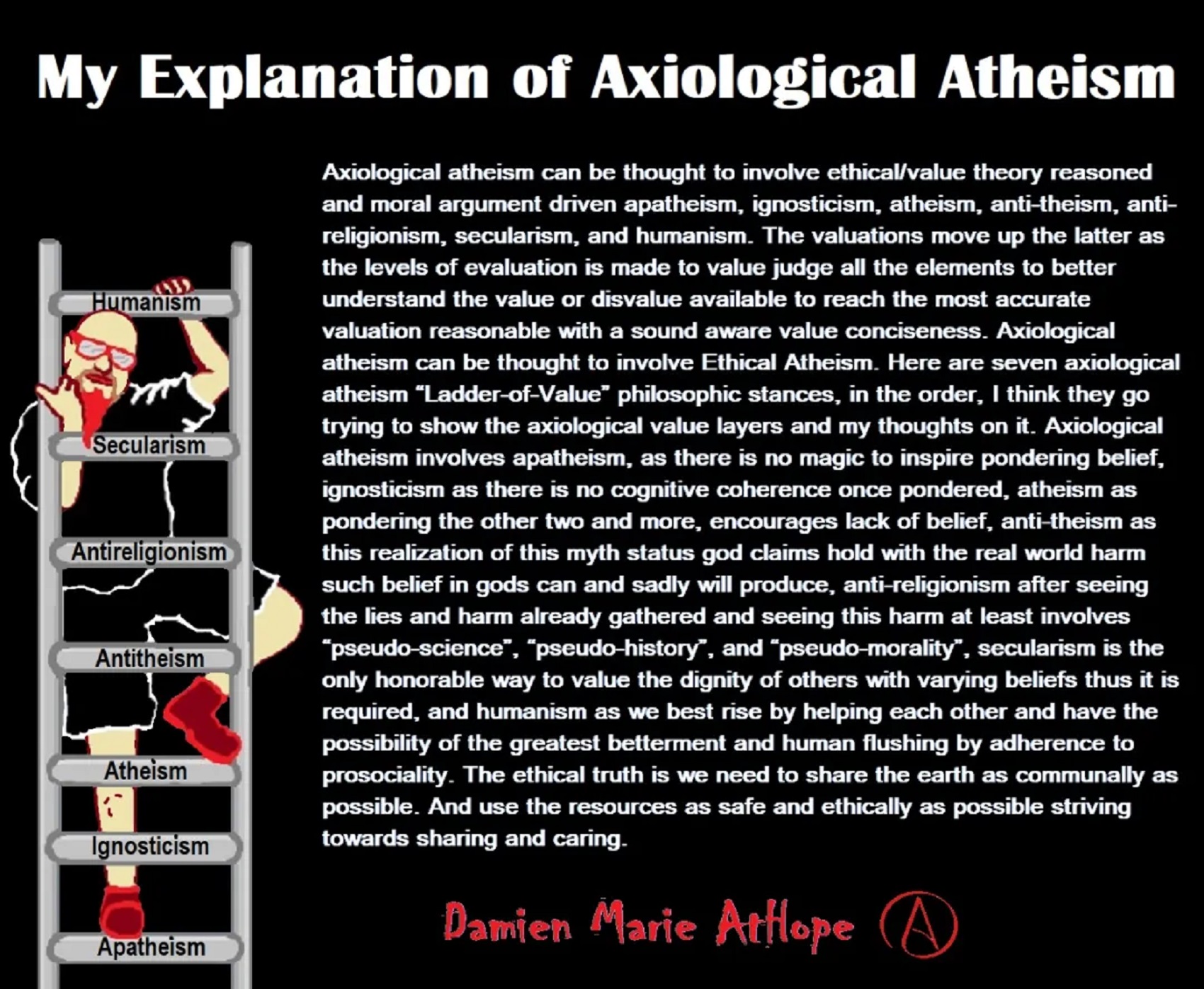
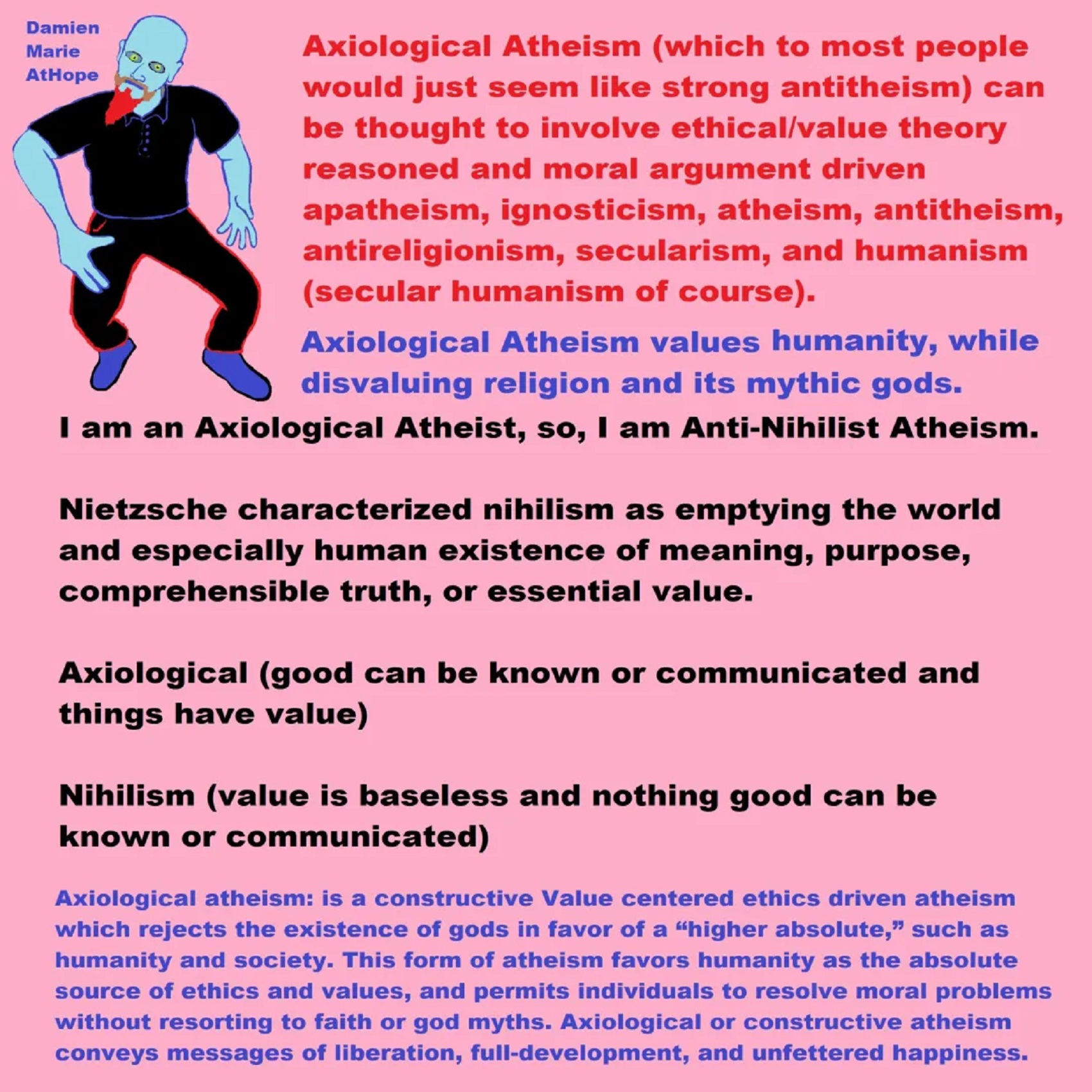
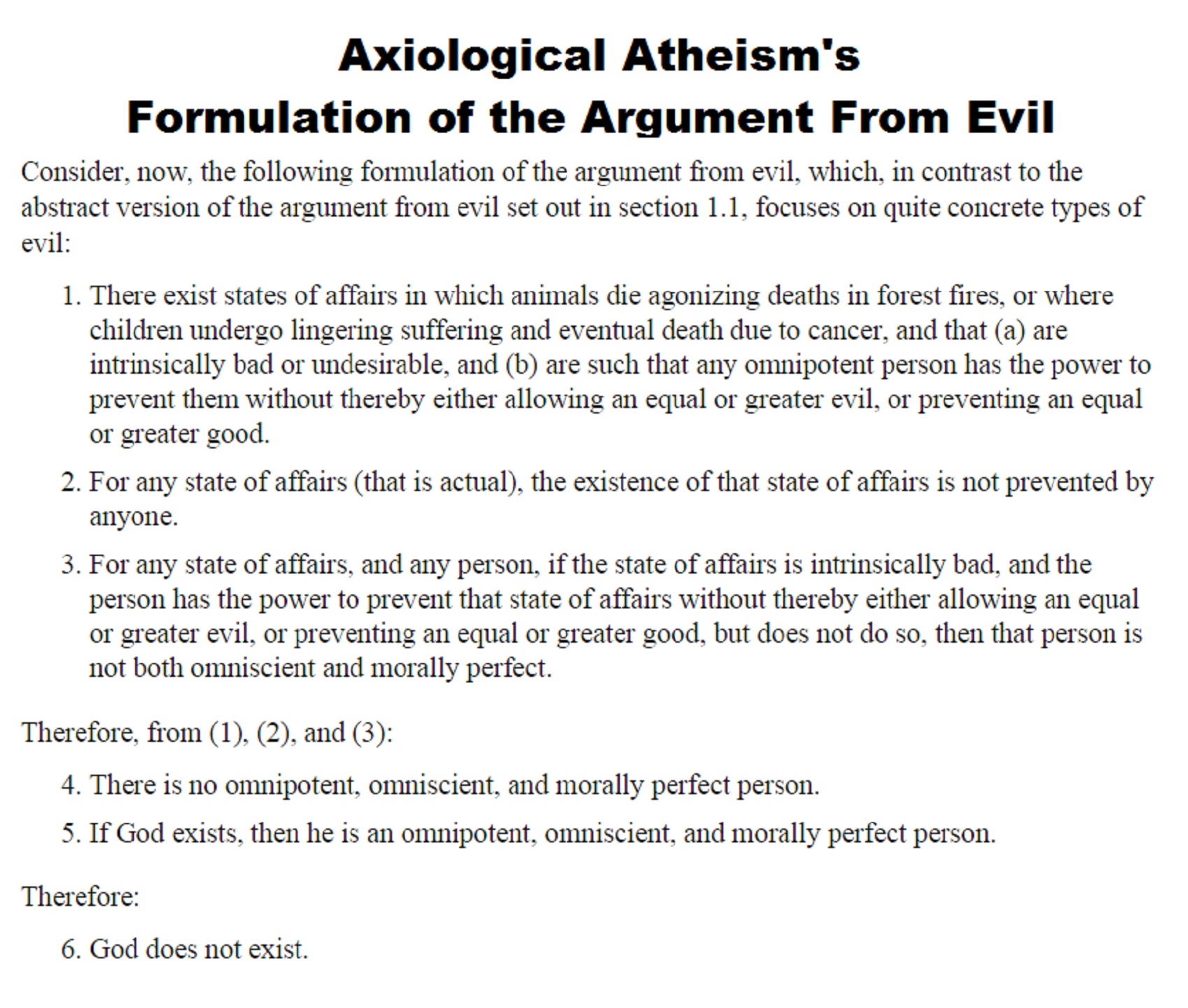
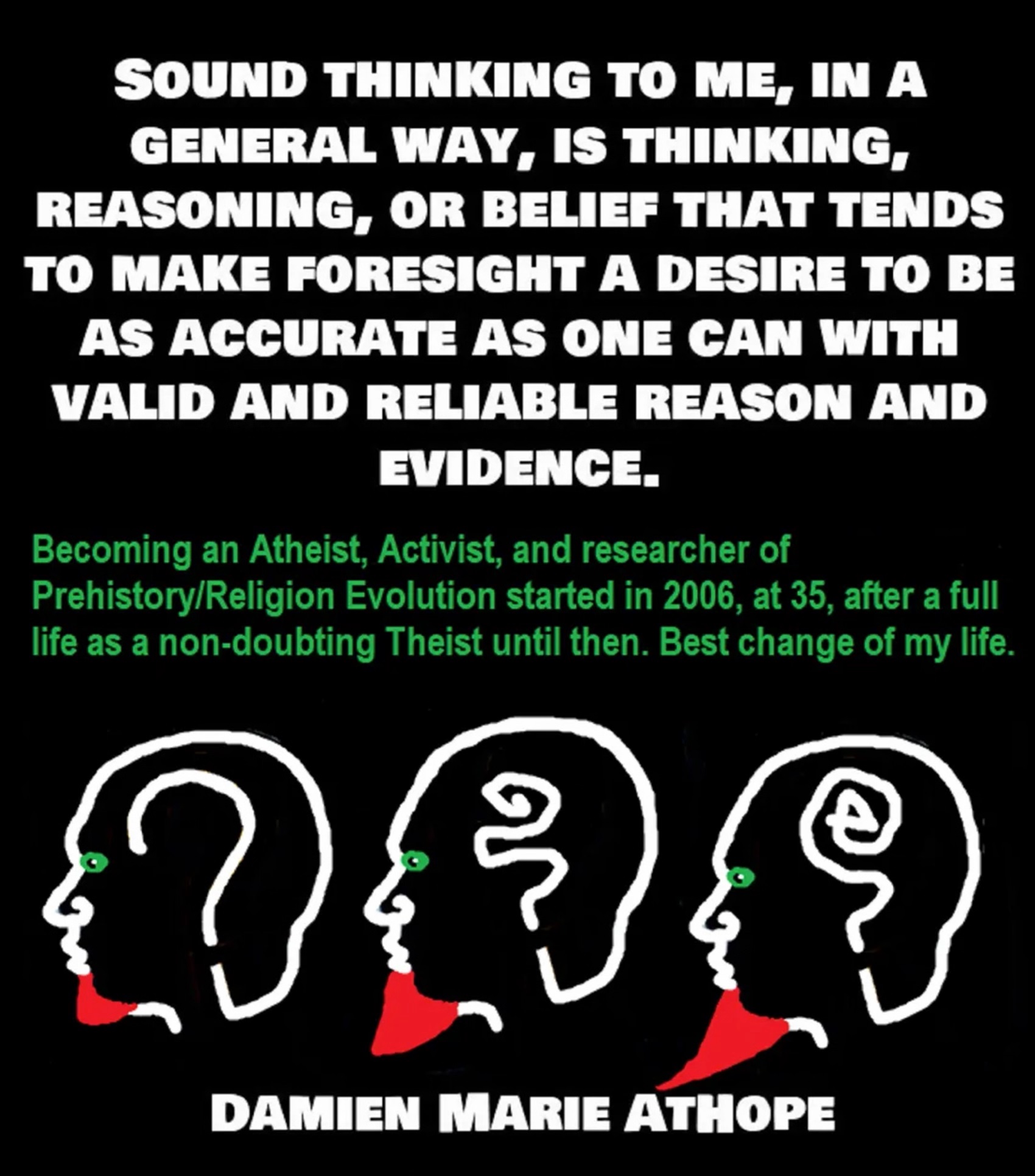
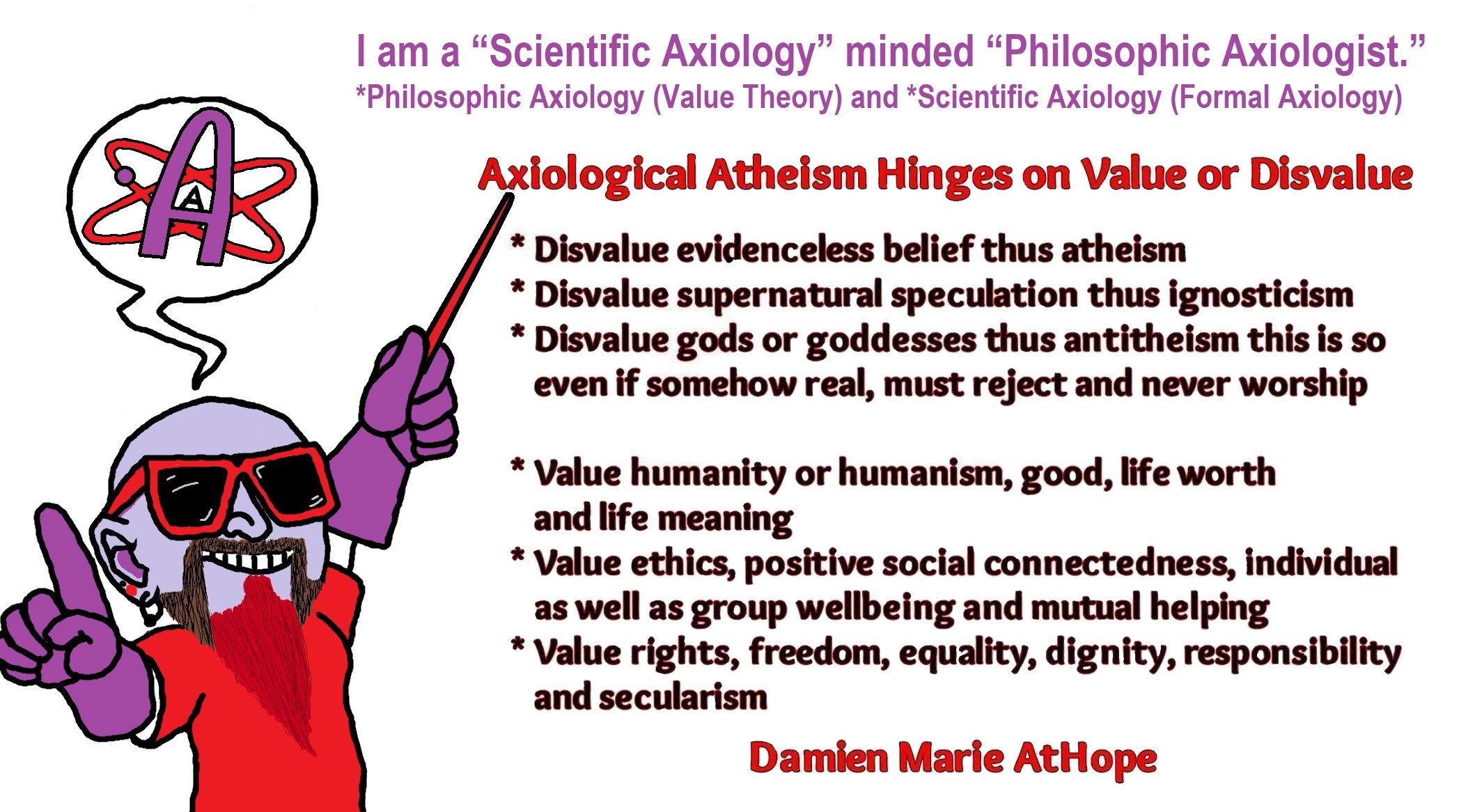
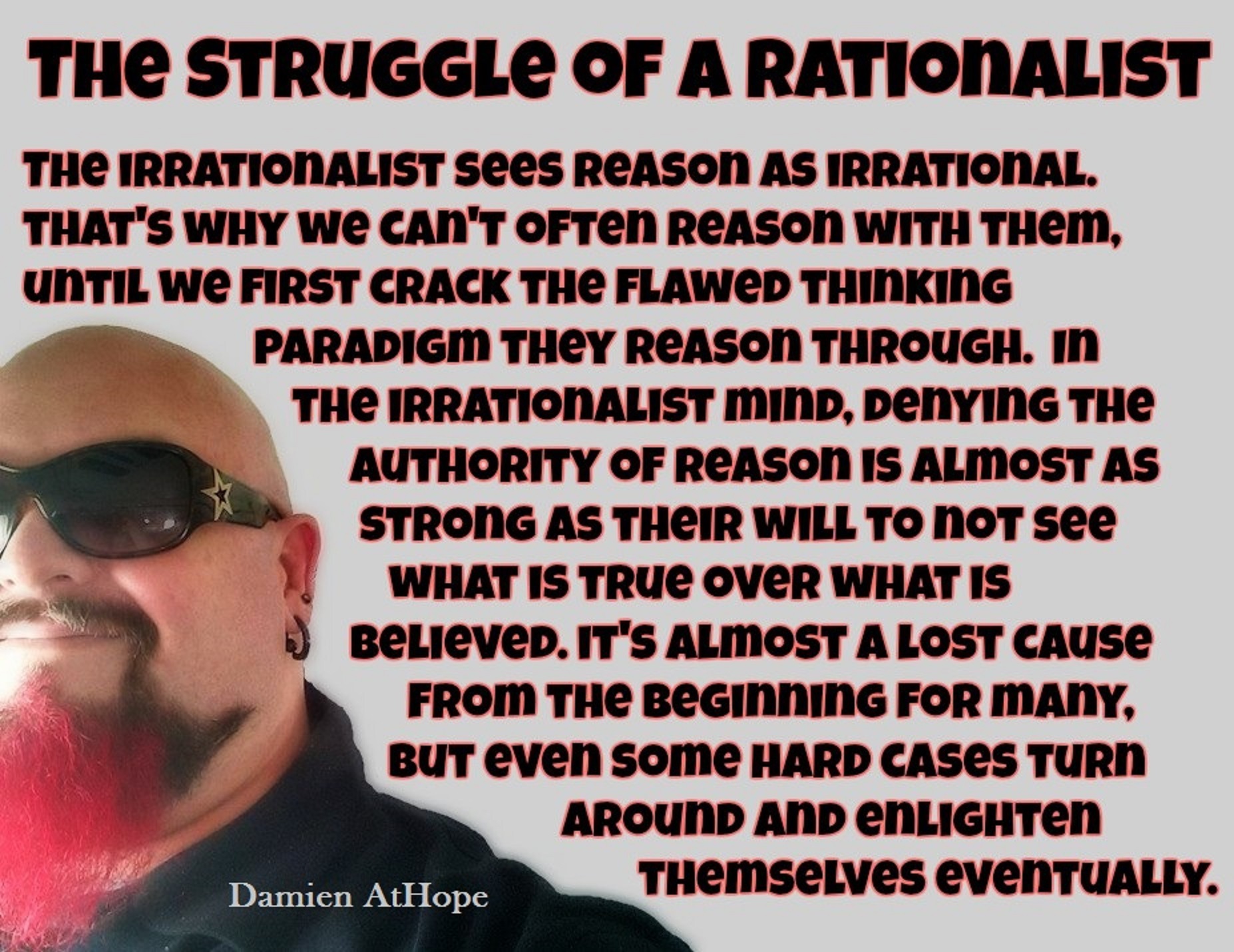
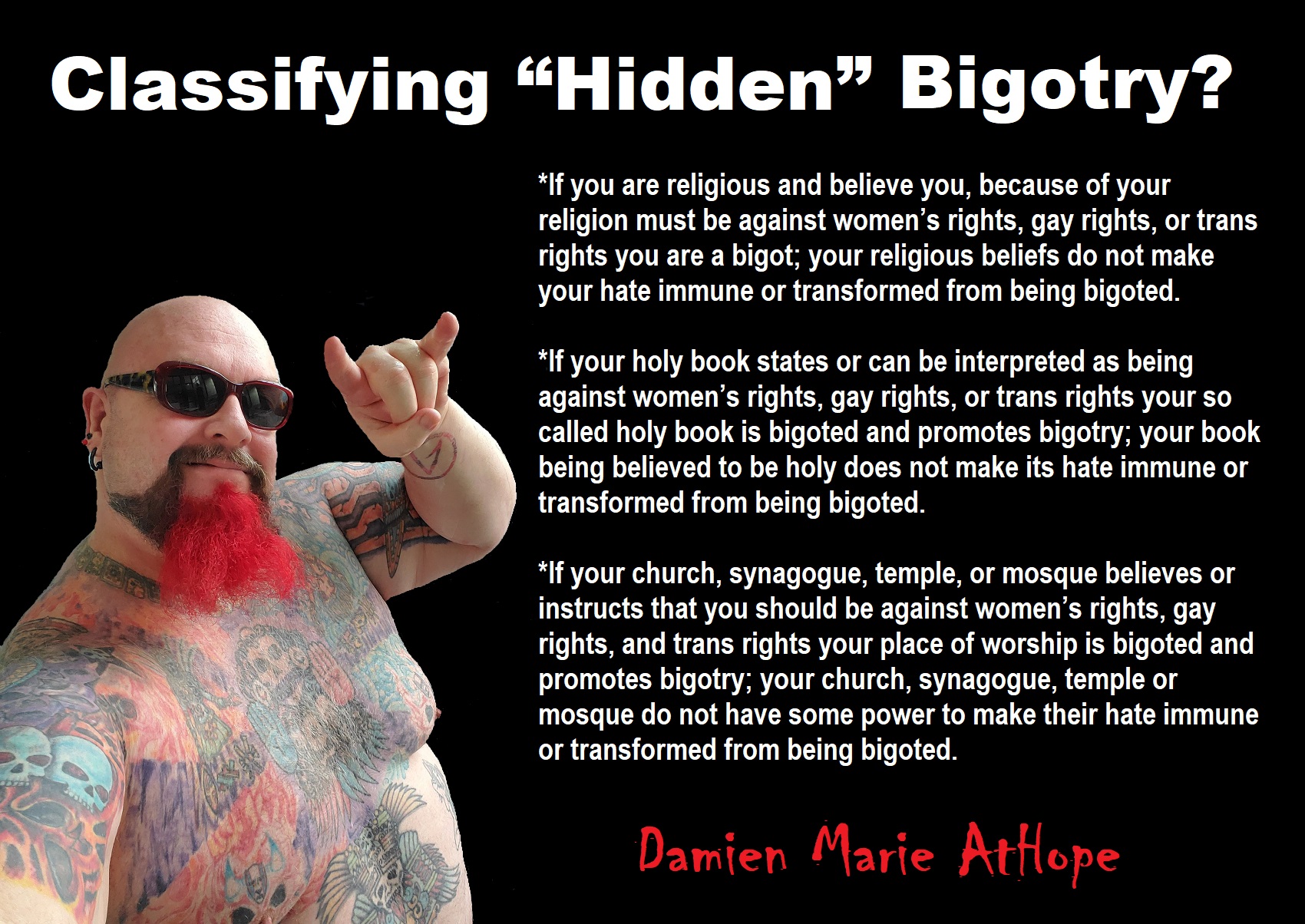
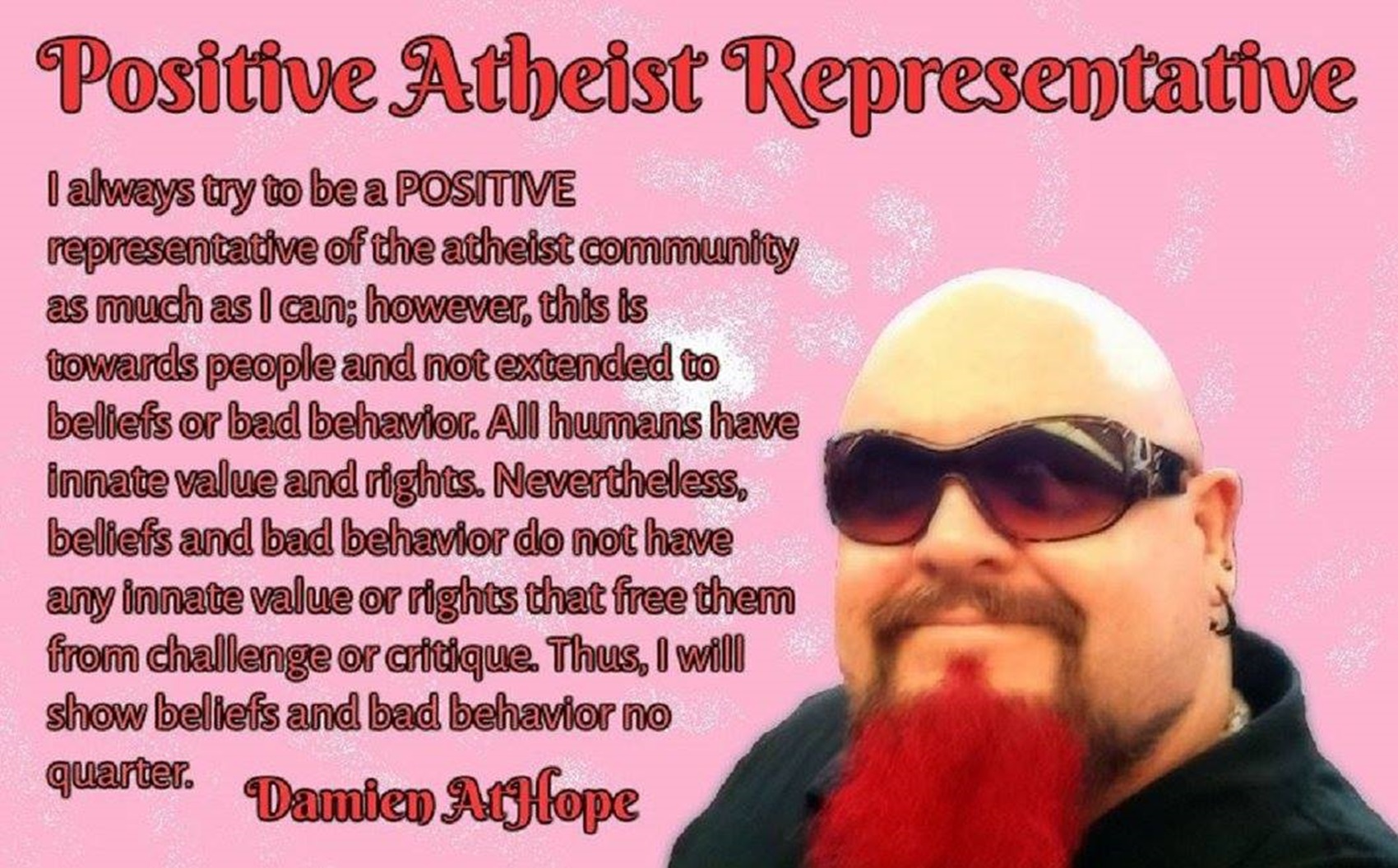
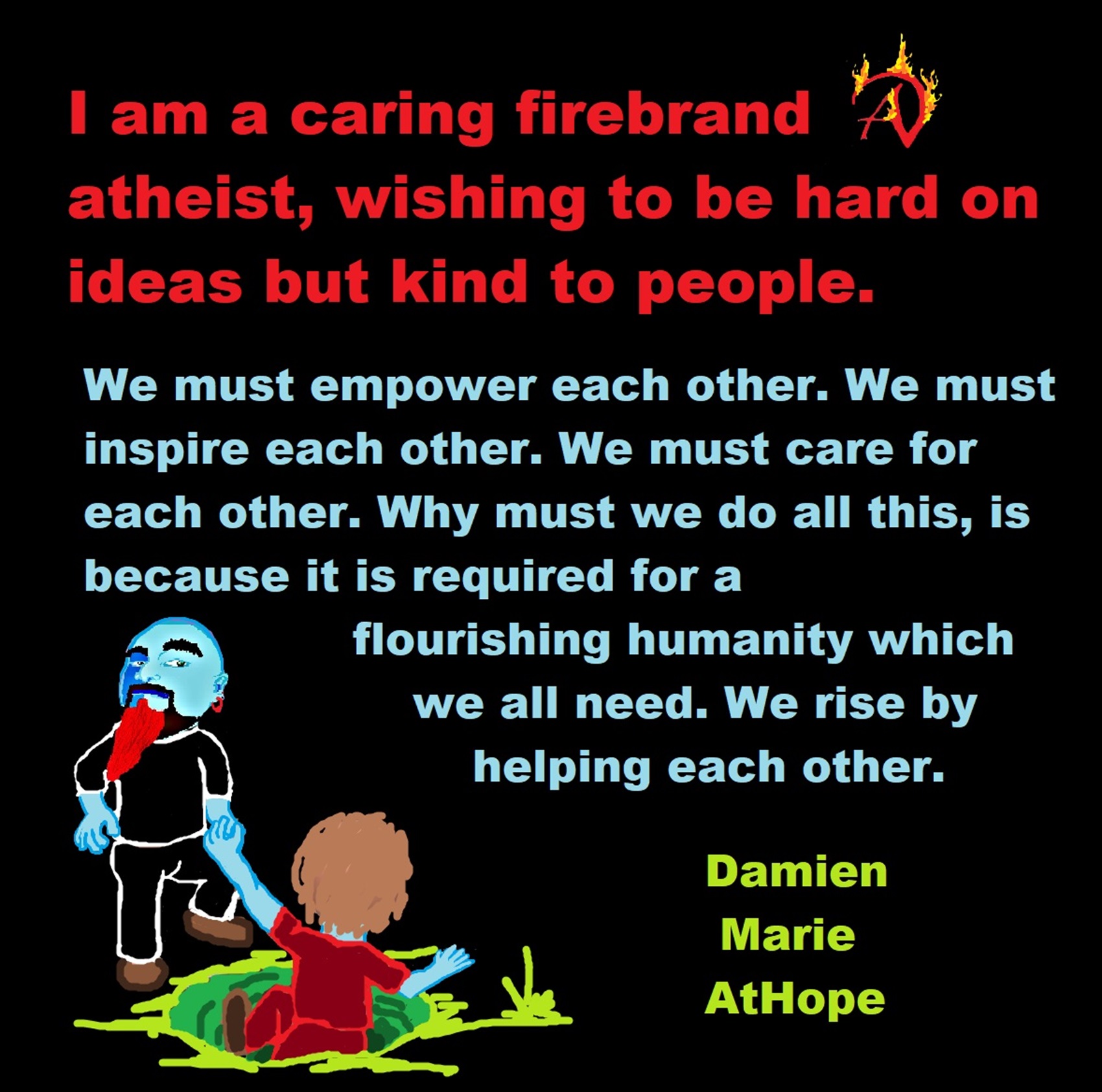
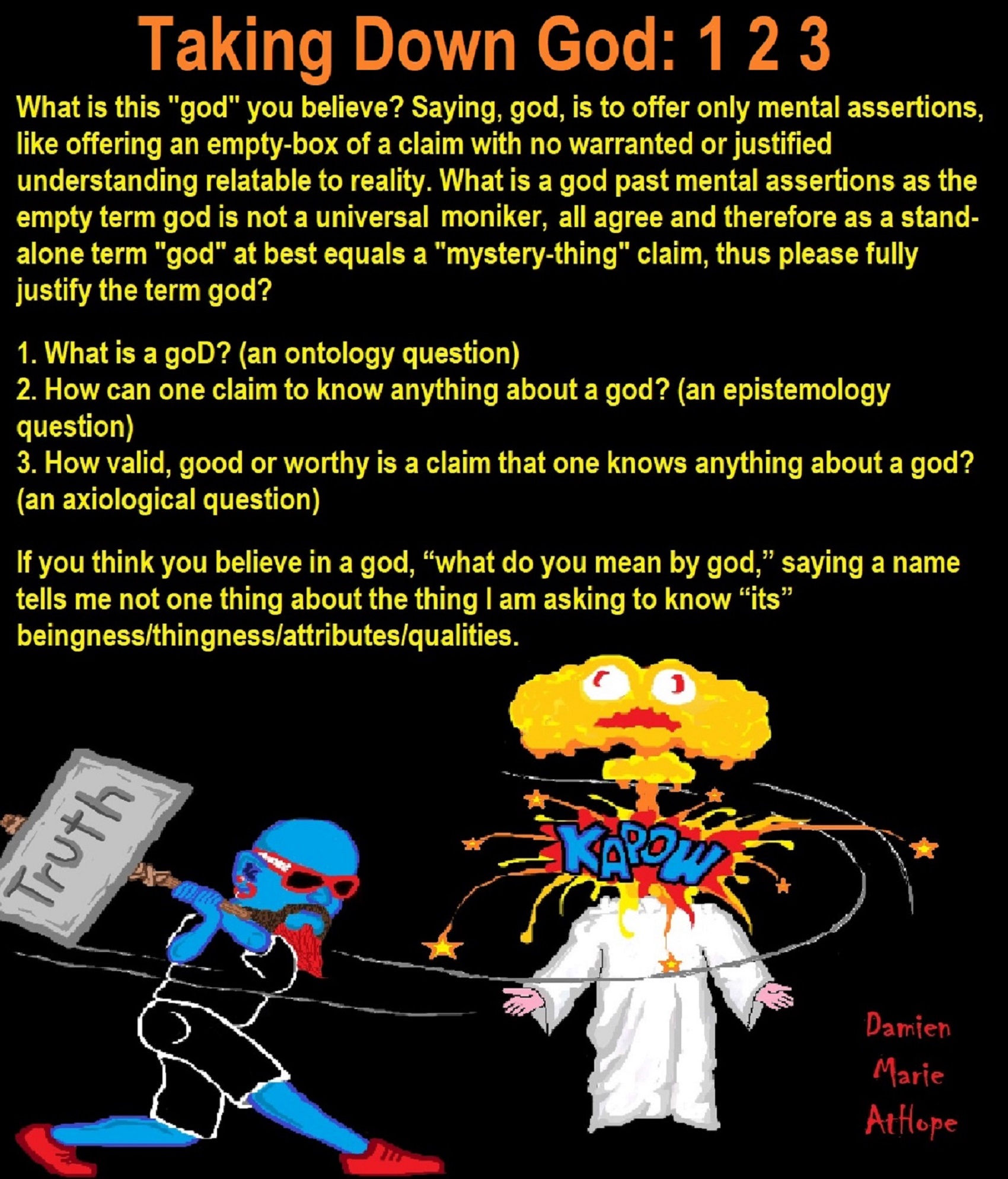
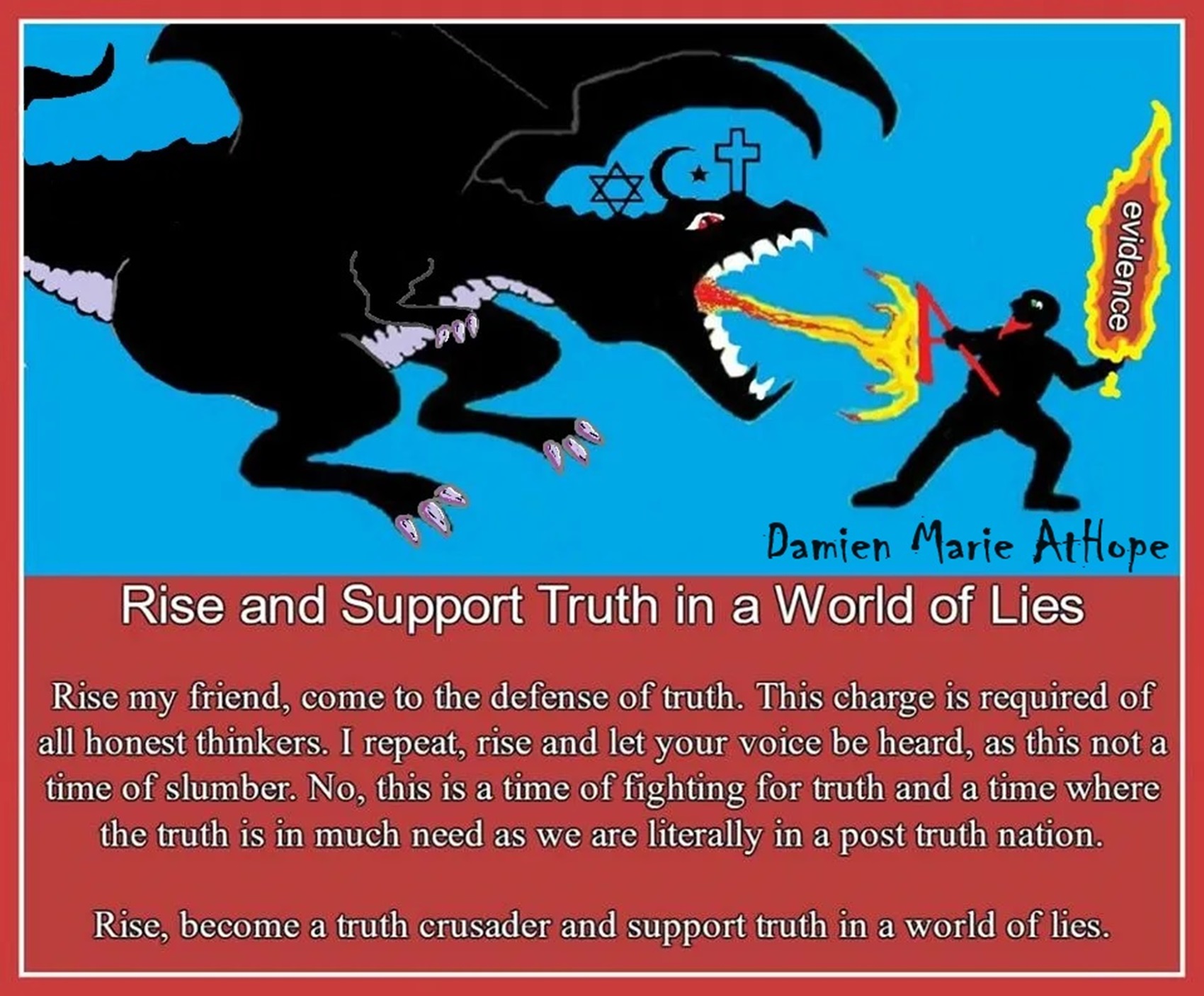

“Theists, there has to be a god, as something can not come from nothing.”
Well, thus something (unknown) happened and then there was something. This does not tell us what the something that may have been involved with something coming from nothing. A supposed first cause, thus something (unknown) happened and then there was something is not an open invitation to claim it as known, neither is it justified to call or label such an unknown as anything, especially an unsubstantiated magical thinking belief born of mythology and religious storytelling.


While hallucinogens are associated with shamanism, it is alcohol that is associated with paganism.
The Atheist-Humanist-Leftist Revolutionaries Shows in the prehistory series:
Show two: Pre-animism 300,000 years old and animism 100,000 years old: related to “Anarchism and Socialism”
Show tree: Totemism 50,000 years old: related to “Anarchism and Socialism”
Show four: Shamanism 30,000 years old: related to “Anarchism and Socialism”
Show five: Paganism 12,000 years old: related to “Anarchism and Socialism”
Show six: Emergence of hierarchy, sexism, slavery, and the new male god dominance: Paganism 7,000-5,000 years old: related to “Anarchism and Socialism” (Capitalism) (World War 0) Elite and their slaves!
Prehistory: related to “Anarchism and Socialism” the division of labor, power, rights, and recourses: VIDEO
Pre-animism 300,000 years old and animism 100,000 years old: related to “Anarchism and Socialism”: VIDEO
Totemism 50,000 years old: related to “Anarchism and Socialism”: VIDEO
Shamanism 30,000 years old: related to “Anarchism and Socialism”: VIDEO
Paganism 12,000 years old: related to “Anarchism and Socialism” (Pre-Capitalism): VIDEO
Paganism 7,000-5,000 years old: related to “Anarchism and Socialism” (Capitalism) (World War 0) Elite and their slaves: VIEDO
Paganism 5,000 years old: progressed organized religion and the state: related to “Anarchism and Socialism” (Kings and the Rise of the State): VIEDO
Paganism 4,000 years old: related to “Anarchism and Socialism” (First Moralistic gods, then the Origin time of Monotheism): VIEDO
I do not hate simply because I challenge and expose myths or lies any more than others being thought of as loving simply because of the protection and hiding from challenge their favored myths or lies.
The truth is best championed in the sunlight of challenge.
An archaeologist once said to me “Damien religion and culture are very different”
My response, So are you saying that was always that way, such as would you say Native Americans’ cultures are separate from their religions? And do you think it always was the way you believe?
I had said that religion was a cultural product. That is still how I see it and there are other archaeologists that think close to me as well. Gods too are the myths of cultures that did not understand science or the world around them, seeing magic/supernatural everywhere.
I personally think there is a goddess and not enough evidence to support a male god at Çatalhöyük but if there was both a male and female god and goddess then I know the kind of gods they were like Proto-Indo-European mythology.
This series idea was addressed in, Anarchist Teaching as Free Public Education or Free Education in the Public: VIDEO
Our 12 video series: Organized Oppression: Mesopotamian State Force and the Politics of power (9,000-4,000 years ago), is adapted from: The Complete and Concise History of the Sumerians and Early Bronze Age Mesopotamia (7000-2000 BC): https://www.youtube.com/watch?v=szFjxmY7jQA by “History with Cy“
Show #1: Mesopotamian State Force and the Politics of Power (Samarra, Halaf, Ubaid)
Show #2: Mesopotamian State Force and the Politics of Power
Show #3: Mesopotamian State Force and the Politics of Power (Uruk and the First Cities)
Show #4: Mesopotamian State Force and the Politics of Power (First Kings)
Show #5: Mesopotamian State Force and the Politics of Power (Early Dynastic Period)
Show #6: Mesopotamian State Force and the Politics of Power
Show #7: Mesopotamian State Force and the Politics of Power (Sargon and Akkadian Rule)
Show #9: Mesopotamian State Force and the Politics of Power (Gudea of Lagash and Utu-hegal)
Show #12: Mesopotamian State Force and the Politics of Power (Aftermath and Legacy of Sumer)

The “Atheist-Humanist-Leftist Revolutionaries”
Cory Johnston ☭ Ⓐ Atheist Leftist @Skepticallefty & I (Damien Marie AtHope) @AthopeMarie (my YouTube & related blog) are working jointly in atheist, antitheist, antireligionist, antifascist, anarchist, socialist, and humanist endeavors in our videos together, generally, every other Saturday.
Why Does Power Bring Responsibility?
Think, how often is it the powerless that start wars, oppress others, or commit genocide? So, I guess the question is to us all, to ask, how can power not carry responsibility in a humanity concept? I know I see the deep ethical responsibility that if there is power their must be a humanistic responsibility of ethical and empathic stewardship of that power. Will I be brave enough to be kind? Will I possess enough courage to be compassionate? Will my valor reach its height of empathy? I as everyone, earns our justified respect by our actions, that are good, ethical, just, protecting, and kind. Do I have enough self-respect to put my love for humanity’s flushing, over being brought down by some of its bad actors? May we all be the ones doing good actions in the world, to help human flourishing.
I create the world I want to live in, striving for flourishing. Which is not a place but a positive potential involvement and promotion; a life of humanist goal precision. To master oneself, also means mastering positive prosocial behaviors needed for human flourishing. I may have lost a god myth as an atheist, but I am happy to tell you, my friend, it is exactly because of that, leaving the mental terrorizer, god belief, that I truly regained my connected ethical as well as kind humanity.
Cory and I will talk about prehistory and theism, addressing the relevance to atheism, anarchism, and socialism.
At the same time as the rise of the male god, 7,000 years ago, there was also the very time there was the rise of violence, war, and clans to kingdoms, then empires, then states. It is all connected back to 7,000 years ago, and it moved across the world.
Cory Johnston: https://damienmarieathope.com/2021/04/cory-johnston-mind-of-a-skeptical-leftist/?v=32aec8db952d
The Mind of a Skeptical Leftist (YouTube)
Cory Johnston: Mind of a Skeptical Leftist @Skepticallefty
The Mind of a Skeptical Leftist By Cory Johnston: “Promoting critical thinking, social justice, and left-wing politics by covering current events and talking to a variety of people. Cory Johnston has been thoughtfully talking to people and attempting to promote critical thinking, social justice, and left-wing politics.” http://anchor.fm/skepticalleft
Cory needs our support. We rise by helping each other.
Cory Johnston ☭ Ⓐ @Skepticallefty Evidence-based atheist leftist (he/him) Producer, host, and co-host of 4 podcasts @skeptarchy @skpoliticspod and @AthopeMarie
Damien Marie AtHope (“At Hope”) Axiological Atheist, Anti-theist, Anti-religionist, Secular Humanist. Rationalist, Writer, Artist, Poet, Philosopher, Advocate, Activist, Psychology, and Armchair Archaeology/Anthropology/Historian.
Damien is interested in: Freedom, Liberty, Justice, Equality, Ethics, Humanism, Science, Atheism, Antiteism, Antireligionism, Ignosticism, Left-Libertarianism, Anarchism, Socialism, Mutualism, Axiology, Metaphysics, LGBTQI, Philosophy, Advocacy, Activism, Mental Health, Psychology, Archaeology, Social Work, Sexual Rights, Marriage Rights, Woman’s Rights, Gender Rights, Child Rights, Secular Rights, Race Equality, Ageism/Disability Equality, Etc. And a far-leftist, “Anarcho-Humanist.”
I am not a good fit in the atheist movement that is mostly pro-capitalist, I am anti-capitalist. Mostly pro-skeptic, I am a rationalist not valuing skepticism. Mostly pro-agnostic, I am anti-agnostic. Mostly limited to anti-Abrahamic religions, I am an anti-religionist.
To me, the “male god” seems to have either emerged or become prominent around 7,000 years ago, whereas the now favored monotheism “male god” is more like 4,000 years ago or so. To me, the “female goddess” seems to have either emerged or become prominent around 11,000-10,000 years ago or so, losing the majority of its once prominence around 2,000 years ago due largely to the now favored monotheism “male god” that grow in prominence after 4,000 years ago or so.
My Thought on the Evolution of Gods?
Animal protector deities from old totems/spirit animal beliefs come first to me, 13,000/12,000 years ago, then women as deities 11,000/10,000 years ago, then male gods around 7,000/8,000 years ago. Moralistic gods around 5,000/4,000 years ago, and monotheistic gods around 4,000/3,000 years ago.
To me, animal gods were likely first related to totemism animals around 13,000 to 12,000 years ago or older. Female as goddesses was next to me, 11,000 to 10,000 years ago or so with the emergence of agriculture. Then male gods come about 8,000 to 7,000 years ago with clan wars. Many monotheism-themed religions started in henotheism, emerging out of polytheism/paganism.


Damien Marie AtHope (Said as “At” “Hope”)/(Autodidact Polymath but not good at math):
Axiological Atheist, Anti-theist, Anti-religionist, Secular Humanist, Rationalist, Writer, Artist, Jeweler, Poet, “autodidact” Philosopher, schooled in Psychology, and “autodidact” Armchair Archaeology/Anthropology/Pre-Historian (Knowledgeable in the range of: 1 million to 5,000/4,000 years ago). I am an anarchist socialist politically. Reasons for or Types of Atheism
My Website, My Blog, & Short-writing or Quotes, My YouTube, Twitter: @AthopeMarie, and My Email: damien.marie.athope@gmail.com

